.
PART TWO: BEST BOOKS & FAVORITE READS OF 2023
We hope you saw the first part of our listing of the Hearts & Minds 2023 awards, such as they are, telling of my favs from 2023. You can, in fact, read all of our old BookNotes posts since they are archived at our website, near the order form page. You can see the last one (PART ONE) right here.
I am hoping to post a PART THREE soon, which will name some eccentric stuff, some top scholarly books a read, and maybe a novel or two. Please keep an eye open for that. As always, we are grateful. Stay warm and safe out there.
All books mentioned are 20% off and can be ordered by scrolling to the bottom and clicking the “order” button, which takes you to our secure order form page. Just tell us what you want and we’ll do the rest.
BEST BOOKS ABOUT BOOKS
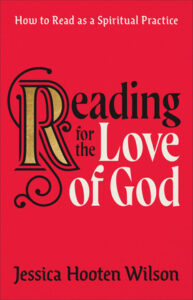 Reading for the Love of God: How to Read as a Spiritual Practice Jessica Hooten Wilson (Brazos Press) $24.99 OUR SALE PRICE = $19.99
Reading for the Love of God: How to Read as a Spiritual Practice Jessica Hooten Wilson (Brazos Press) $24.99 OUR SALE PRICE = $19.99
When I go out and do talks about books or meet with Zoom groups to cheer-lead for reading circles, I often cite other authors, more eloquent than I, who make a case for reading deeply, widely, seriously. Like the truest sports fans who love reading good sports writers or the foodies who not only experiment with their cuisine but love reading about it, so many readers love books about books. We’ve got a section like that in our store and many are near and dear to our hearts.
This 2023 is a gem, a treasure, a wise guidebook to knowing what we mean when we invite people to read widely and how to go about doing that. Hooten Wilson is a great teacher, a fine writer, and here she not only shows how reading should be a spiritual practice which can lead to notable transformation, but gives vivid case studies. She explores how key Christian thinkers of the past read and engaged the printed page, showing us how to read like Augustine or Julian of Norwich or Frederick Douglas or Dorothy Sayers. Her piece on Flannery O’Connor was perhaps penned as she was working on O’Connor’s unfinished novel Why Do The Heathen Rage that just came out a week or so ago (kicking off 2024 to a grand literary start!) This is fabulous, inspiring, winsome and learned all at once, wrapped up into an award winning best book of 2023.
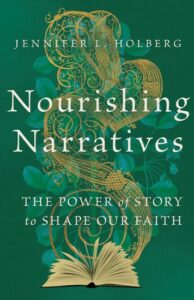 Nourishing Narratives: The Power of Story to Shape Our Faith Jennifer L. Holberg (IVP Academic) $25.00 OUR SALE PRICE = $20.00
Nourishing Narratives: The Power of Story to Shape Our Faith Jennifer L. Holberg (IVP Academic) $25.00 OUR SALE PRICE = $20.00
Humans are story-shaped creatures, the back cover tells us, boldly. And we know it, don’t we? We “make sense of our world, pattern our lives, and reflect on what is ultimately significant through language and the words that compose our stories.”
The Bible, Professor Holberg is quick to remind us, is also a book of story; even the legal commandments, the ethical teachings, the theology and doxology, happen in the context of a grand meta-narrative, the unfolding drama from Genesis to Revelation. Might our story and God’s story intermesh? Can stories — you know, novels and short stories, classics and modern ones, poems and pop songs, movies and TV shows — can stories help bridge our story and God’s story? Can narratives be nourishing and help us make sense of our life and our faith?
You know the answer. This is the most lovely, interesting, upbeat, tender, thoughtful book about all this stuff that I have ever read. Holberg teaches literature at Calvin University and is a co-director of the Calvin Center for Faith & Writing (I hope you are coming to their 2024 Festival this Spring!) She knows a bit about the reading life, about the power of books, about how to “understand how stories nourish our faith (and) to discover how our stories are part of God’s great story.” I hope you saw my earlier BookNotes review where I hinted that it was one of my favorite books of the year; it was suh a lovely, inspiring read. Months later I agree, now more than ever. Hooray.
Not only is Jennifer Holberg a clear, compelling, and beautiful writer, but her words in Nourishing Narratives are also filled with truth and goodness. I can’t remember the last time I read a book that made my heart sing along as this one did. Nourishing Narratives will open your eyes, grow your faith, and feed your soul. — Karen Swallow Prior, author of The Evangelical Imagination: How Stories, Images & Metaphors Created a Culture in Crisis
Funny and approachable, erudite and smart, this book is not merely a celebration of literature–it is an invitation to learn how to read as if our faith lives depend on it. Jennifer Holberg shows us why we love stories and, more importantly, why we need them. –James K. A. Smith, editor in chief of Image journal, author of You Are What You Love and How to Inhabit Time
THE MOST CREATIVE APPROACH TO SOCIAL ETHICS (AND MUCH MORE)
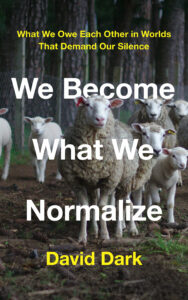 We Become What We Normalize: What We Owe Each Other in Worlds That Demand Our Silence David Dark (Broadleaf Books) $26.99 OUR SALE PRICE = $21.59
We Become What We Normalize: What We Owe Each Other in Worlds That Demand Our Silence David Dark (Broadleaf Books) $26.99 OUR SALE PRICE = $21.59
David Dark is always my teacher and I learn something about the world, about the meaning of integrity, about faith and politics and art and life, with nearly every tweet or social media post or printed page he does. That’s a lot of learning going down and if you are still moved by the primal cry of, say, David Byrne —“my God, what have I done?” — and want to be done with “same as it ever was” — then this book, believe me, this book is for you.
And if you don’t get that, that’s okay. Because David is patient and kind and wants to invite into his orbit of conversation all sorts of people, all sorts of readers. I do not think I know anyone who so earnestly endeavors to be good news in a hurting world, also by being gracious, if forthright, always. And when he blows it, he admits as much. He knows that our modern technologies sometimes facilitate us harming others and he is attentive to that; he’s learned some stuff and shares it here. Following how he calls out political leaders and the preachers that seem to cover for them in his home state (again, on social media) is an instruction.
This recent book carries that project on; it emerges from his heart and gives shape to the shape of his work. He is, as I tried to say in an earlier review, not only wanting to resist idols and fake news and the temptations of power but he wants to build connection and community. This book shows how, in very creative prose, in wild stories, in a few allusions that might seem weird — especially that “White Supremacist Antichrist Poltergeist” bit and the subsequent robot soft exorcism thing, but hang in there, it makes sense eventually. You will appreciate this stuff about “courage, conscience, and deferential fear” and how to manage our feelings, even in these polarized times. You’ve got to read the chapter “Beyondism.”
This book is brave, some have said, and it is: David tells his own story of complicity and his own story of breaking free from his own sense of safety, moving towards beloved community. He is from the South, raised in a Bible believing home, and grew to love rock and roll, movies and films, performances and protests. From sci-fi to Fred Rogers, he illuminates his tales with wisdom and goodness. He is not messing around, except when he maybe is. (A note near the end speaks of the “healing game of infinite play.”)
I said some things about We Become What We Normalize in BookNotes when it first came out and only said a bit of what I wanted; there is just so much. I have read it twice and am still left needing to consider more. I invite you to know that I am awarding it an obvious Best Book of 2023 award and, small time bookstore that we are, I hope it inspires somebody to give him a try. He’s bold and allusive, edgy and playful, serious and spiritual, without any of it being predictable or normal. I compliment David to say I don’t think I know a writer out there doing what he does. Skip Kafka or Vonnegut or whoever else you turn to for edgy inspiration. David is the real deal, a prophet of sorts, Biblically literate and a follower of the Way, a Tennessee Bono-like leader, getting things done. There is no shame in all of this; there is humanness and joy. He offers, as put in a remarkable back cover blurb by the remarkable Hanif Abdurraquib (They Can’t Kill Us Until They Kill Us) “a light flickering in the midst of darkness.”
THREE FAVORITE BOOKS ON WORK
Every year we look for a favorite read or two in this exceedingly important field, and while there is always a good one or two in recent years, this year we offer a special Hearts & Minds award of appreciation to the Denver Institute for Faith & Work. Members of their team have created three titles this year, each which seem, to me, to be “just what the doctor ordered.” These three each deserve a whole lot of attention. Hooray.
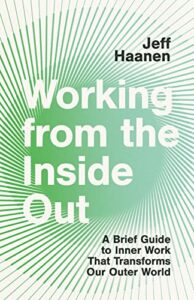 Working from the Inside Out: A Brief Guide to Inner Work That Transforms Our Outer World Jeff Haanen (IVP) $18.00 OUR SALE PRICE = $14.40
Working from the Inside Out: A Brief Guide to Inner Work That Transforms Our Outer World Jeff Haanen (IVP) $18.00 OUR SALE PRICE = $14.40
I was glad to highlight this when it first came out and while I don’t think I’ve ever met Jeff, I feel like we are so simpatico that we are comrades of some sort. (I know, a dumb thing for a bookstore owner to say to an esteemed writer.) I had waited for this when it was a work-in-progress and happily announced it when it first released a month or so ago. It may be one of the very best introductory books on this field for one who wants a mid-level, exceedingly thoughtful resource. But not only does it offer a vivid and solid vision of the importance of our vocation and callings into the world worlds, but it, as Chris Horst (of HOPE International) puts it, “In Working from the Inside Out, Jeff Haanen takes on what takes us on.” Exactly. Very highly recommended.
Read Katherine Leary Alsdorf’s astute description and know why we want to honor it as one of the very best books this year.
I can’t wait to give this book to some important people in my life! As the title suggests, Jeff Haanen’s most valuable contribution is his focus on our inner spiritual life and the promise that a life attuned to the hope, love, and grace of the gospel changes us. Work is a crucible; it forms and shapes us–for better or for worse. Jeff’s five guiding principles (seek deep spiritual health, think theologically, embrace relationships, create good work, and serve others), developed and tested during his decade with Denver Institute for Faith & Work, offer a way toward work forming us ‘for better.’ — Katherine Leary Alsdorf, founding director of Redeemer Presbyterian Church’s Center for Faith and Work
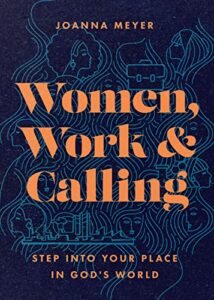 Women, Work, and Calling: Step Into Your Place in God’s World Joanna Meyer (IVP) $15.00 OUR SALE PRICE = $12.00
Women, Work, and Calling: Step Into Your Place in God’s World Joanna Meyer (IVP) $15.00 OUR SALE PRICE = $12.00
Of course women should read any number of the classics in the field — the premier title is co-authored by Katherine Leary Aldsorf (Every Good Endeavor with Tim Keller) and we always recommend it. But for someone wanting a fairly simple, uniquely Christian study of work and calling specifically for women this is simply the best thing out there. We’ve long appreciated Katelyn Beaty’s 2017 title, A Woman’s Place: A Christian Vision for Your Calling in the Office, the Home, and the World which is necessarily broad. Meyer’s is more focused, direct, updated, and since it emerges from her work at the Denver Institute it is exceptional — savvy about careers as well as the contemporary cultural moment. It is short and powerful and is a very important contribution for the movement of integrating faith and work. One chapter is called “A Gospel as Big as the World” and another says, “God Grows Your Soul Through Work.” Some will appreciate her playful “Don’t Lean In, Lean Hard.” You’ve got to read this, or give it to a woman you know.
In this much-needed book, Joanna Meyer explores internal and external challenges that Christian women face in the workplace. In short and accessible chapters appropriate for individuals or groups, Meyer draws on Scripture, social science research, and the voices of Christian leaders to provide guidance for navigating these challenges. I highly recommend this book for women at every career stage, from the college student to the seasoned professional, and everyone in between. — Denise Daniels, Professor of Entrepreneurship at Wheaton College, author, Working in the Presence of God: Spiritual Practices for Everyday Work
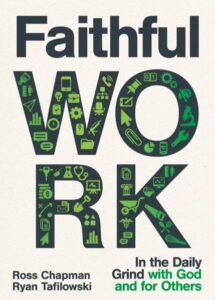 Faithful Work: In the Daily Grind with God and for Others Ross Chapman & Ryan Tafilowski (IVP) $15.00 OUR SALE PRICE = $12.00
Faithful Work: In the Daily Grind with God and for Others Ross Chapman & Ryan Tafilowski (IVP) $15.00 OUR SALE PRICE = $12.00
Only once did a Christian scholar enter our store and demean us for not being academic enough. Often, many think we recommend things that are a wee bit too challenging, too hefty, too complex. We know different sorts of books are designed for different sorts of readers and for those wanting or needing a very short, really basic, nicely simple, altogether lovely book about the huge amount of time we spend in the work world, then this is the one to read. We are really proud to have such excellent, brief, basic books and want to honor this one, for sure. Chapman and Tafliowski show how “work is a way to love God, serve our neighbors, and demonstrate the gospel.” With this broad understanding of God’s work in the world, they say, “we engage our daily work as part of how God makes all things new.” Exactly.
Hooray for this and congrats to Rod Chapman as the new CEO of the Denver Institute for Faith and Work. He holds a DMin in faith, work, economics, and vocation from Fuller so knows what he’s doing. Ryan Tafilowski is a theology prof at Denver Seminary, a pastor, and holds a PhD in systematics from the University of Edinburgh. For a while he was the “theologian in residence” at the Denver Institute. This may be short and sweet but it is not shallow or superficial. Excellently done, award winning, I’d say. Yay.
THREE ONE-OF-A-KIND SMALL BOOKS ON THE CHURCH YEAR
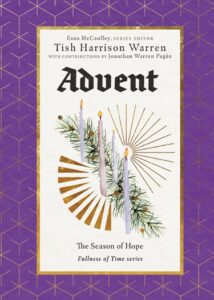
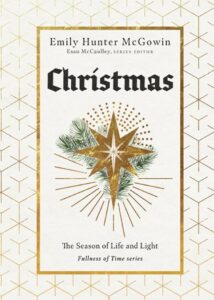
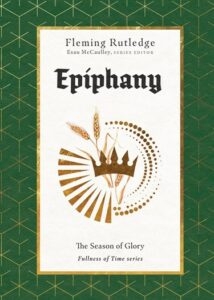
Advent: The Season of Hope Tish Harrison Warren (IVP) $20.00 – OUR SALE PRICE = $16.00
Christmas: The Season of Life and Light Emily Hunter McGowin (IVP) $20.00 – OUR SALE PRICE = $16.00
Epiphany: Season of Glory Fleming Rutledge (IVP) $20.00 – OUR SALE PRICE = $16.00
I have written about all of these three marvelous books previously, and they are preceded by the others so far released in the great “Fullness of Time” series curated and edited by Esau McCauley. The first two were Lent: The Season of Repentance and Renewal and Pentecost:A Day of Power for All People, both which were quite good. These three, though, were so very excellent, they made their way onto our Best Books of 2023 list. I’d say something Latin if I could: these are extraordinary, rich, readable and short. Thanks be to God for all three of these fabulous books. Highly recommended.
Whether you are an aficionado of liturgical studies or are more traditionally free or low-church or even if you aren’t sure what Advent is all about (let alone the religious significance of the twelve days of Christmas or Epiphany, whatever that is) I invite you to order these. We believe they are deserving of much attention and offer thanks to the authors and to Dr. McCauley for his expert guidance in the project. Will more come later in 2024?
BEST FAMILY DEVOTIONAL THAT ATTENDS TO THE CHURCH CALENDAR
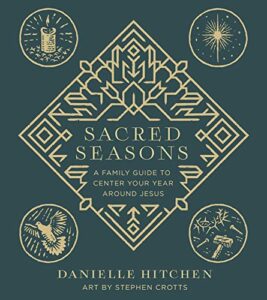 Sacred Seasons: A Family Guide to Center Your Year Around Jesus Danielle Hitchen, illustrations by Stephen Crotts (Harvest House) $29.99 OUR SALE PRICE = $23.99
Sacred Seasons: A Family Guide to Center Your Year Around Jesus Danielle Hitchen, illustrations by Stephen Crotts (Harvest House) $29.99 OUR SALE PRICE = $23.99
This is hands-down our favorite family devotional that we’ve seen this year, mostly because it is oriented around the church year. I do not know if the author is Anglican or has found another sort of intentionally liturgical worshipping community, but she surely gets it. The book is fresh and fun, utterly Christ-centered, and illustrated handsomely with just the right touch of class. Harvest House is a pop level evangelical press who occasionally does extraordinary books and this is one of great surprises of the year.
Danielle is a thoughtful teacher whose invitational spirit will help you learn and grow alongside your family as you journey through the liturgical year. This deeply rooted offering is informational yet accessible, historical yet approachable. The spiritual rhythms, routines, and rituals in this artful collection are sure to resource families for years to come. — Kayla Craig, author of To Light Their Way and creator of the Liturgies for Parents podcast
More than any resource I know, Sacred Seasons makes following the Christian calendar approachable and enjoyable. This book is meticulously researched and theologically robust–it will be an enormous blessing to anyone who wants to enter more deeply into the rhythms of grace God has given his church. — Matthew Lee Anderson, author, Called Into Questions and founder of Mere Orthodoxy
FAVORITE 2023 MARRIAGE BOOK
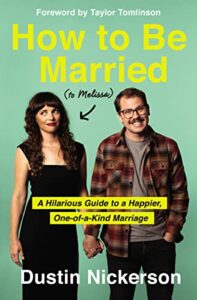 How To Be Married (To Melissa) – A Hilarious Guide to a Happier, One-of-a-Kind Marriage Dustin Nickerson (Nelson Books) $19.99 OUR SALE PRICE = $15.99
How To Be Married (To Melissa) – A Hilarious Guide to a Happier, One-of-a-Kind Marriage Dustin Nickerson (Nelson Books) $19.99 OUR SALE PRICE = $15.99
I don’t recall what I was even thinking when I started this crazy book. I knew the author was a clean comedian, working in the mainstream of comedy clubs and such, a person of some kind of faith, and that he sells his marriage book at his stand-up gigs. That itself is, if not exactly hilarious, kind of funny. I was game.
And I was utterly captivated, sometimes almost like a train wreck that you just can’t stop watching. Nickerson tells (in pretty funny writing that sometimes is really funny) of fights they’ve had, how old baggage can haunt you, how to solve problems, stuff about money, and a bit about sex. Yep, he goes there, in a cringy/funny sort of way. And did I mention fights? These guys fight about everything.
And he’s friends with Taylor Tomlinson who wrote a fabulously great foreword; it doesn’t sound like she was bribed on anything, although she admits she didn’t read the part on sex; she just didn’t want to hear about that from him, sort of a second dad in the comedy biz.
And you know what? This is one of the most honest, realistic, practical, fun, and hopeful marriage books I’ve read, maybe ever. He mouths off about all kinds of stuff — he’s a stand up comedian, after all, an introvert, no less, too — and then his wife Melissa chimes in with rebuttals or sidebars or postscripts. Like their marriage, this is a pretty collaborative process and they obviously like each other and respect each other a lot. And they love their kids fiercely, even if they make fun of them a lot. It’s that kind of family.
As the back cover says, “Marriage isn’t always funny. But that doesn’t mean you can’t laugh about it.”
“Marriage isn’t always funny. But that doesn’t mean you can’t laugh about it.”
There are two valuable aspects of this that I loved but that you should know about: first, they insist that no marriage book can do it all, that every relationship is unique and there are no easy answers to a happy marriage, let alone simplistic formulas. I think he’s a bit hard on all the other books out there, as many are truly great, but he’s got a huge point, right? They implied this in the subtitle, so there are no grand one-size-fits-all plans.
Secondly, they have been through some pretty hefty evangelical stuff in a church that made national news for being dysfunctional and toxic. They had already left that place by the time it imploded, but they have that background. They know their Bible and doctrine and they love Jesus, but, well, it just isn’t as central to the book as some might wish. They haven’t exactly “deconstructed” but it comes out in a section where they, as always, invite people to lighten up a bit and laugh about, say, the goofy stuff you do when your trying to herd fighting cats into a car to get to church on time looking all happy and sanctified. Ha.
As the back cover promises, “this book will help your marriage if by no other means than looking at Dustin’s dysfunctional marriage and feeling better about your own.” That’s one award winning bit of promo copy if you ask me. One of the best of the year.
BEST 2023 BOOK OFFERING INSIGHTS ABOUT AMERICAN HISTORY
I already named Saying It Loud: 1966–The Year Black Power Challenged the Civil Rights Movement by Mark Whitaker as one of my favorite books of the year in our previous first part of this Best Books post. That obviously could be placed in this category, too.
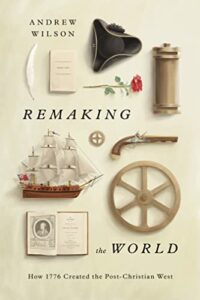 Remaking the World: How 1776 Created the Post-Christian West Andrew Wilson (Crossway) $29.99 OUR SALE PRICE = $23.99
Remaking the World: How 1776 Created the Post-Christian West Andrew Wilson (Crossway) $29.99 OUR SALE PRICE = $23.99
I would give this book more than one award if I could — everything now and then this publisher just makes exquisite volumes, with nice endpapers, quality paper, a good heft, and a textured, neat cover. As soon as this arrived I took delight, knowing that much was special. Then seeing the remarkable endorsements on the back from folks like Alan Jacobs and Karen Swallow Prior and Mark Noll — who calls it a “triumph” — made me pay attention.
Also (let’s be honest) when a publisher who tends to tilt rightward on many social issues and is known for non-compromising commitments to their rigorous theological angle does a book on American history, I sort of assume it might play somewhat into the hands of nationalists and those who make American history an example of exceptionalism of a civic religious sort. I loved the look of the book and was curious why Jacobs and Noll and Prior and the discriminating colonial scholar Thomas Kidd (who said it was a “tour de force”) would rave so.
I was pleasantly surprised that the thesis alluded to in the subtitle is exactly what this book is about. Wilson colorfully examines things that happened in a single year in the late eighteenth century that “changed the trajectory of the Western world.” Arising from 1776, he shows, we have things like globalization, the Enlightenment, the industrial revolution, the dawn of romanticism and the rise of post-Christianity. Yes, he draws on key documents and historical figures, but it is lively and easy to follow. I think it deserves being on our list of Best Books.
And it deserves some award for this, too: Wilson uses an acronym to help us follow the plot. He says that these political, philosophical, economics, and industrial changes “shaped the modern West into a WEIRDER society: Western, Educated, Industrialized, Rich, Democratic, Ex-Christian, and Romantic.” What a hoot — who knew that’s where our weirdness comes from? You’ve got to read this amazing volume. More than 350 pages including the voluminous notes.
A FAVORITE COLLECTION OF OP-ED ESSAYS
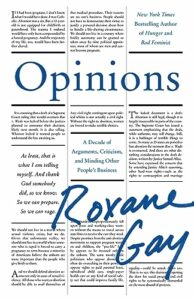 Opinions: A Decade of Arguments, Criticisms, and Minding Other People’s Business Roxane Gay (Harper) $30.00 OUR SALE PRICE = $24.00
Opinions: A Decade of Arguments, Criticisms, and Minding Other People’s Business Roxane Gay (Harper) $30.00 OUR SALE PRICE = $24.00
I love reading short form essays, articles, columns, op-ed pieces. Among my all time favorite reads are two marvelous, vital collections of essays by Barbara Kingsolver and two lovely, wise, moving collections by Ann Patchett. I adored (a year ago) Thin Places: Essays from In Between by Jordan Eisner and although it came out a year ago, one of my most moving reading experiences this year was taking up Terry Tempest Williams’ essay collection, Erosion: Essays of Undoing.
Anyway, much of this is one more directly political and whether I agree with her or not isn’t the point. A book like this collects provocative, blazing pieces and that, as Slate called her book Bad Feminist, “arresting and sensitive.” Her book Hunger was one of the most moving books I’ve ever read — her questions about black bodies and about being fat will stay with me forever — and I like that the New York Times Book Review has called her writing “luminous intellectually rigorous, and deeply moving.”
She works hard at her craft of writing and her op-ed work is important. Her longer pieces — a few celebrity stories, and some from her “Dear Abby” type advice column make for entertaining reading. Naturally, many will not agree with her fully, or rarely, for that matter. Still, this is a handsomely bound collection of a decade of her work and I was really pleased to have it. She is a vital force, a voice for the outcasts, and she is worth honoring.
FAVORITE MEMOIRS
Oh my. This is my favorite genre, often, and what I’m often reading at bedtime. Some are so well written, the lives they narrate so interesting, that I’m transported, perhaps even more than reading mere fiction. I’ve read a lot and reviewed a few. Here are my highlights, personal favs, each for different reasons. Maybe these aren’t all for everyone, but I liked them. A lot.
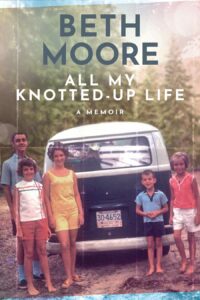 All My Knotted-Up Life: A Memoir Beth Moore (Tyndale) $27.99 OUR SALE PRICE = $22.39
All My Knotted-Up Life: A Memoir Beth Moore (Tyndale) $27.99 OUR SALE PRICE = $22.39
This was perhaps my biggest surprise of the year, realizing quickly just how very much I loved this book and how very much I came to admire this iconic Southern Baptist women’s Bible teacher who became disillusioned with their sexism and cruelty. This is one heck of a page-turning story, well told, earnest, important. She’s a good writer, really! You will learn some things about her life and marriage and family and some of it will grab you in a way from which you may never recover. Surely one of the best books of the year.
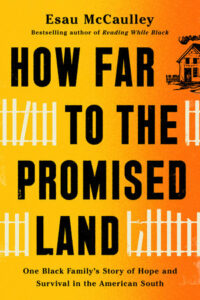 How Far to the Promised Land: One Black Family’s Story of Hope and Survival in the American South Esau McCaulley (Convergent Books) $27.00 OUR SALE PRICE = $21.60
How Far to the Promised Land: One Black Family’s Story of Hope and Survival in the American South Esau McCaulley (Convergent Books) $27.00 OUR SALE PRICE = $21.60
We were glad to see how much press this book got, his fairly straight-forward story was so well told and illustrative of so much that it ended up on some major newspapers and mags Best Books of 2023 lists. It chronicles his journey from rural, poor, Jim Crow Alabama (and his role in a Pentecostal church) to becoming a PhD candidate in Scotland, landing a job as New Testament prof at Wheaton College. The details of his own family and their story is insightful and, as much black writing as there is these days (happily so) this stands out. Publisher’s Weekly is right to say it is written with “uncompromising honesty and deep introspection.” Kudos.
I love this comment about it:
Esau McCaulley’s riveting memoir holds together tensions that many of us pry apart: systemic injustice and personal responsibility, accountability and forgiveness, honesty and sympathy. This book is prophetic without being preachy, and heartwarming without being cloying. . . . A triumph of storytelling. — Tish Harrison Warren, author of Liturgy of the Ordinary and Prayer in the Night
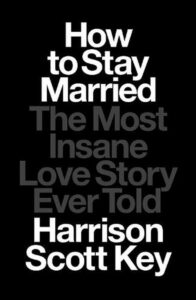 How to Stay Married: The Most Insane Love Story Ever Told Harrison Scott Key (Avid Reader Press) $27.99 OUR SALE PRICE = $22.39
How to Stay Married: The Most Insane Love Story Ever Told Harrison Scott Key (Avid Reader Press) $27.99 OUR SALE PRICE = $22.39
I have been waiting for another moving, thoughtful, hilarious book by this intelligent, entertaining, respected prose writer since we devoured The Largest Man On Earth and Congratulations, Who are You Again?, two of my all time favorite reads. Little did I know that in subsequent years his wife had an affair and he wrote about it all, in gruesomely honest detail, including his (understandable) unChristian hatred for the guy, an uninspiring neighbor. In my review of this earlier in the year I mentioned how funny this was, how I ripped through it, breathless, hoping against hope for some kind of happy ending. I won’t spoil it all, but it is one of the best books I read all year.
I almost wanted to name this at the start of the last post where I had those ultimate top two favorite books, but I really wanted it to be here among the memoirs. Still, it really is a Best Book of the Year, if you can take it… and it is funny, in a tragic sort of way. Kudos to all involved and hats off to the gang that helped him through.
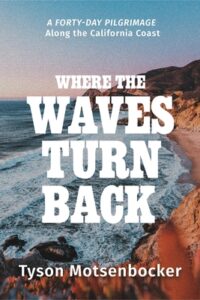 Where the Waves Turn Back: A Forty-Day Pilgrimage Along the California Coast Tyson Motsenbocker (Worthy Books) $27.00 OUR SALE PRICE = $21.60
Where the Waves Turn Back: A Forty-Day Pilgrimage Along the California Coast Tyson Motsenbocker (Worthy Books) $27.00 OUR SALE PRICE = $21.60
I hope you recall my long review of this last summer — the short version is that Tyson (a hip, Gen X singer-songwriter) spends a long and harrowing forty days hiking an ancient trail carrying the ashes of his beloved mother who died too young. He dodges all kinds of bullets, meets hoboes, connects with old friends, and does the whole hiking memoir thing with a casual meandering tone that ends up winning. So good — on of my favs of the year, for sure.
 Meet Me Tonight in Atlantic City: A Memoir Jane Wong (Tin House Books) $27.95 OUR SALE PRICE = $22.36
Meet Me Tonight in Atlantic City: A Memoir Jane Wong (Tin House Books) $27.95 OUR SALE PRICE = $22.36
If you know Jane Wong for her highly regarded poetry you will want to know about her life growing up in a New Jersey Chinese restaurant (she says such kids are called “restaurant babies) and her girlhood, ongoing studies, love lives, cross-cultural experiences, intense struggles; it not a linear autobiography and at times seems nearly random. But I couldn’t stop reading. Some of the book is nearly light-hearted (and you’ll love her colorful mother) but some of it is heavy, too. I appreciated her rage, especially about fetishizing sexual violence against Asian-Ameircan women.
Ms Wong loves her metaphors and it became fun catching some that make no sense whatsoever. She’s a poet, I kept saying to myself. But, man…
Kirkus Review says it is:
A generous, steaming stew of a book loaded with personality and originality and sprinkled with the fiery chili of rage.
It was a favorite read this year for me, and, anyway –any book that can inspire that kind of a line deserves an award, right?
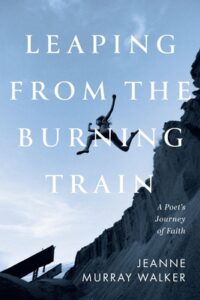 Leaping from the Burning Train: A Poet’s Journey of Faith Jeanne Murray Walker (Slant Books) $20.00 OUR SALE PRICE = $16.00
Leaping from the Burning Train: A Poet’s Journey of Faith Jeanne Murray Walker (Slant Books) $20.00 OUR SALE PRICE = $16.00
This, too, was not only one of the best memoirs I read this year but a book that I so enjoyed that I’ve promoted it to folks who may not be directly interested in how a poet came to emerge with faith intact from a strict, conservative, fundamentalist upbringing. It’s just a great read on its own term, a splendid memoir, narrating a fascinating life.
Unlike some deconstruction narratives these days, this one is — for starters — really wonderfully written. Walker is a thoughtful, faithful, lover of literature and it shows in clear, clean, writing that is full of images and metaphors and ideas, but never grows obscure. She has seen some forms of faith that are not fully healthy and are certainly not intellectually viable, but this is not a horrible story of toxic faith and religious harm. It is just the story of coming to terms with how we all make sense of things and how she moved away from the literalism of her funky little Christian school and revivalistic faith and her frugal, frugal parents.
She can name the moment it became clear — through the study of literature and poetry — that we interpret stuff. Indeed, there are different readings (some more plausible than others, perhaps) and insight is always contingent, understood within the skin of the interpreter. Ahh, that seemingly secular learning helped her understand that we “seek through a glass dimly” and need a more flexible and humble faith, makes for a wonderful plot switch. And yet, she can’t shake her faith. Her ups and downs are chronicled here so wonderfully I am sure I’m going to read this one again. Beautifully done; very highly recommended.
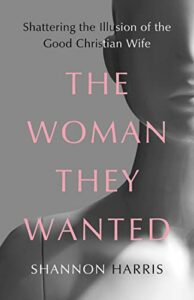 The Women They Wanted: Shattering the Illusion of the Good Christian Wife Shannon Harris (Broadleaf Books) $27.99 OUR SALE PRICE = $22.39
The Women They Wanted: Shattering the Illusion of the Good Christian Wife Shannon Harris (Broadleaf Books) $27.99 OUR SALE PRICE = $22.39
I want to name this because it was a really important glimpse into a toxic faith community that was, not long ago, respected by many, including people I once knew. For those who want a hard, painful, anguishing expose of really stupid stuff going on in a nationally known church movement with celebrity pastors, this is the one. It was infuriating how evangelicals could become so strict, and so wrong about gender roles. Married, finally, to Joshua Harris (famously the young author of I Kissed Dating Goodbye) who was groomed to replace the needlessly arrogant C.J. Mahany at the Sovereign Grace movements mothership in Gaithersburg, this tells Ms Harris’s story as am earnest woman in a misogynist subculture. We learn about their rigid views — more harsh perhaps than some of us realized — and their admixture of charismatic renewal and hyper-calvinism. We learn about their Bible studies and mentoring groups and less than adequate relationships, even as the church leaders seemed to think they were doing it all so well. Spoiler alert: it took some time for the toll to be taken but it was a deadly mix and it ruined their marriage.
Mr. Harris has come to renounce all of that (perhaps leaving the faith altogether) and in The Women They Wanted she offers her candid howl of grief for all those lost years. She understandably struggles with what sort of faith might rise from these ashes, and my heart went out to her, even as I kept wondering why she put up with such oddball stuff. When church leaders made her disinvite her oldest best friends from being in her wedding, she should have bolted right then and there — but you can imagine how one somewhat new to the faith and new to the church and being raised up as a celebrity pastor’s stellar wife, she played along, despite this huge red flag. The way other conservative evangelicals overlooked this toxic stuff and the way the church failed to show adequate grace and insight is horrifying, making this book, if not a literary masterpiece, certainly an important report from the scene.
And that cover! We should talk about that…
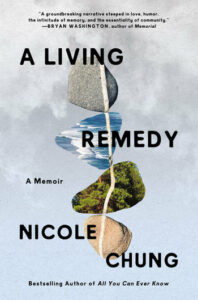 A Living Remedy: A Memoir Nicole Chung (Ecco) $29.99 OUR SALE PRICE = $23.99
A Living Remedy: A Memoir Nicole Chung (Ecco) $29.99 OUR SALE PRICE = $23.99
You may know of her previous memoir, much about being an Asian American child adopted into a kindly white family in a largely white region in rural Oregon. There are, as they say, troubling truths. Yet she loves her extended family and, as a writer of remarkable talent, she explores the story of her fathers illness and death, the bereavement of her mother, and, through it all, the horrible situation created in part by our inadequate health care systems.
I had underlined a passage that I later noticed another reviewer had cited: Her father’s death, she says, felt like “a kind of negligent homicide, facilitated and sped by the state’s failure to fulfill its most basic responsibilities to him and others like him.” I’ve been thinking about this narrative, it’s great love and it’s portrayal of family life amidst great sorrow.
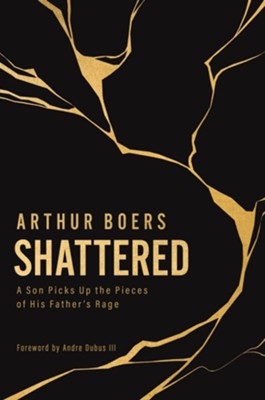 Shattered: A Son Picks Up the Pieces of His Father’s Rage Arthur Boers (Eerdmans) $22.99 OUR SALE PRICE = $18.39
Shattered: A Son Picks Up the Pieces of His Father’s Rage Arthur Boers (Eerdmans) $22.99 OUR SALE PRICE = $18.39
When an amazing, highly regarded literary figure like Andre Dubus writes a stunningly great introduction, as he has here, one wonders how good a book can be to garner that kind of praise. Well, as I tried to express in a long review last spring, Arthur Boers tells in glowing prose and extraordinary insight the nature of a life lived in a strict, Reformed, immigrant subculture with a violent father. His father worked in glass manufacturing so the “shattered” language of the title is luminous and serves any number of meanings. It is a rich book, one I will never forget.
Several reviews have noted that Arthur has not only emerged in his faith in somewhat different styles and perspectives, but has wisely offered balanced and healthy leadership in the various spaces he has served. He was raised in a Dutch Canadian, conservative Calvinist community with their particular continental worldview and found a lively faith in a nondenominational group in his public school, until he found a home in an Anabaptist faith. He was active as a Mennonite where he developed friendships (that bore fruit in several important books) with the likes of Presbyterian Eugene Peterson and Roman Catholic philosopher and cultural critic Albert Borgman. Although it isn’t the concern of the book — it is a memoir of growing up and finding some degree of healing from his father’s rage — he is now a Canadian Anglican, with a ministry in spiritual direction. It ends beautifully describing this sort of contemplative vision and a restful attention to the natural world. It is a breathtaking book, hard and wondrous, a true award winner, a notable book of 2023.
 The Best Strangers in the World: Stories from a Life Spent Listening Ari Shapiro (HarperOne) $28.99 OUR SALE PRICE = $23.19
The Best Strangers in the World: Stories from a Life Spent Listening Ari Shapiro (HarperOne) $28.99 OUR SALE PRICE = $23.19
Ha — this was such a blast I couldn’t wait to announce my decision to name it as a vivid favorite this year. I reviewed it at BookNotes and you can search for those comments if you want more, but, believe me, this was a really fun read, lovely, even, and a very inspiring story of the famous NPR voice. What a kid he was, one of the only Jews in his Fargo, North Dakata school.
The journey to and of a “life spent listening” is fabulous, making the book so interesting, pleasurable and insightful. It was a great read.
Some may not know of Ari’s role in the peacemaking efforts of the rowdy, diverse band called Pink Martinis, but he is part of that singing group, and that, too makes for some fun stories of them singing Israeli folk songs to Arab Muslims or pushing other ethnic tunes in places where it might be considered dangerous to do so. As is often the case, good art wins the day, and this book — mostly about learning the craft of being a globally known reporter — is a testimony to the art and craft of being a good human being.
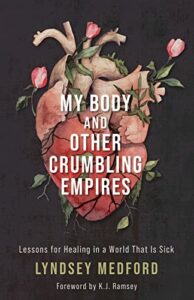 Lessons for Healing in a World That Is Sick Lyndsey Medford (Broadleaf Books) $25.99 OUR SALE PRICE = $20.79
Lessons for Healing in a World That Is Sick Lyndsey Medford (Broadleaf Books) $25.99 OUR SALE PRICE = $20.79
Almost every year I find myself wiping away tears and taking notes while reading a book about chronic illness, whether it was the must-read reflection about having Lyme disease (by reporter and scholar Ross Douthart) or the beautiful story told so eloquently in The Invisible Kingdom: Reimagining Chronic Illness by Meghan O’Rourke (an editor at the Yale Review.) I believe that this year, the book that stood out in this sometimes painful reading genre is My Body and Other Crumbling Empires. Some of it was simply captivating for the unfolding narrative and other pages were the sort where you have to put the book now to to think, to ponder, to take it in. She is a heck of a writer and is doing something pretty audacious. She is working on everything from theodicy to liberation theology to the nature of feminist embodiment ideals for our Christian living, to a more systematic understanding of the principalities and powers that make the whole world sick. In her hands, this story of being ill, seriously so, causes her to rethink everything.
The publisher explains it nicely: “My Body and Other Crumbling Empires points out the beauty and ubiquity of our limitations; the importance of accessibility, broadly construed; the interconnected nature of individual and public health; and the badly needed wisdom we have gained from living with our particular bodies.”
Friends — agree fully or not, resonate at first or not, this is what books can do. Wow. Wow. And I love that great art on the book jacket. Again, wow.
I’m inspired by Lyndsey Medford’s deft mix of gentleness and fire. She speaks the truth we crave and manages to do so with the voice of a trusted friend. — Shannan Martin, author,The Ministry of Ordinary Places and Start with Hello
BEST BIOGRAPHIES
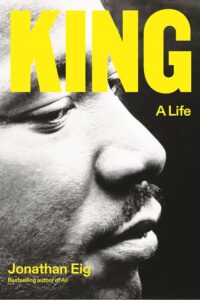 King: A Life Jonathan Eig (Farrar Straus Giroux) $35.00 OUR SALE PRICE = $28.00
King: A Life Jonathan Eig (Farrar Straus Giroux) $35.00 OUR SALE PRICE = $28.00
At about 650 pages and obviously thick, I wanted to give this some heavy award; heck, I will admit I have not even finished it yet. But there is no doubt that this is a book that is simply definitive, enduring, perhaps never to be surpassed. There have been plenty of good biographies of Dr. King and I have read several. There is plenty for those who want to know more. When I first heard that this was the first major biography in decades, perhaps to better the classic ones — like David Garrow’s say — I sputtered a bit. Do we really need yet another biography?
Ahh, but here is what makes Jonathan Eig’s so incredibly important. It is the first major work that was done on Dr. King since the FBI released formerly declassified files. This archival stuff obviously offered fresh information, and now, in King, we have a book that is an immediate classic, the release of which is a true literary event.
Blurbs rave on the back in a mighty choir of testimony— Peniel Joseph David Garrow, Lerone Martin, Ken Burns. This is one for the ages. It is not only the first major biography of King in a generation, it is one of the most important books of the decade.
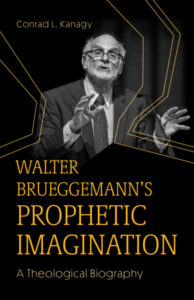 Walter Brueggemann’s Prophetic Imagination: A Theological Biography Conrad L. Kanagy (Fortress) $24.95 OUR SALE PRICE = $19.96
Walter Brueggemann’s Prophetic Imagination: A Theological Biography Conrad L. Kanagy (Fortress) $24.95 OUR SALE PRICE = $19.96
Well, Walter Brueggemann is not as famous or influential as MLK but, you know, in his own way, he has left a mark perhaps unlike any Biblical scholar in the last 50 years. In the religious landscape of mainline denominational folks he is a household name; among thoughtful Catholic and evangelical scholars and activists, he is revered. He is an icon among the progressive, social action faith movements, like Sojourners, say, where he often publishes. In the guild of academic Biblical studies he has (if not single-handedly, almost) causes a shift in the patterns of thinking that pervade critical Biblical scholarship. To this day, his many books — including a brand new collection of marvelous blog posts expertly edited by Kanagy —keep coming and his Biblical comment, prayers, and social observation is legendary.
This is the first, and perhaps landmark biography of the Bible scholar and seminary teacher and mentor to many who coined the phrase “prophetic imagination.” It emerged as the central Pennsylvania Mennonite pastor Kanagy got to know Brueggemann over weekly Zoom calls. As Walter’s stories unfolded, as Kanagay pressed him to tell more, the two of the realized they had a book. It is a wonderful biography, a notable tribute, a great tool to help us understand how Brueggemann understands the Bible, God, the vocation of Christian fidelity, and what it means to speak truth to power in these days. It will help us all (in the words of Duke professor Ellen Davis) “make sense of our experience of what is still possible with God…”
Beth and I have crossed paths with Brueggemann several times over the years, selling books at events, and he has always been alert to the Scriptures, attentive to those in the room, and very kind to us. How did he become who he is? How does he combine the pastoral and the prophetic? This book gives a clue. If you don’t own it yet, you should. Congrats to Kanagy and thank you to Dr. Brueggemann.
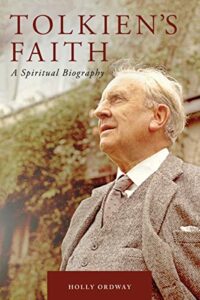 Tolkien’s Faith: A Spiritual Biography Holly Ordway (Word on Fire Academic) $34.95 OUR SALE PRICE = $27.96
Tolkien’s Faith: A Spiritual Biography Holly Ordway (Word on Fire Academic) $34.95 OUR SALE PRICE = $27.96
Well. If this wasn’t on the major book lists, something is fishy because, by all measures and reports from those who know, this is a major work, done with an exquisite style, by an extraordinary woman who is known for being an expert in apologetics and in literature. Obvious, if these nearly 550 pages show anything it is that she is up to the task, offering a diligent (but not tedious) study of the great writer’s life and the way in which his Catholic faith shaped his life, his writing, his work, and, of course, his friendships.
There are forty chapters (and a number of appendices) that will delight any true fan of Lord of the Rings and there is enough in here to illustrate how JRR’s had such an influence upon his pal and writing buddy, C.S. Lewis. Of course we could fill pages naming important words about Tolkien and his Inklings. (Forgive me if I just name-check a few: I suppose most know Tom Shippey’s highly regarded J.R.R. Tolkien: Author of the Century but please don’t miss Joseph Loconte’s A Hobbit, a Wardrobe, and a Great War: How J.R.R. Tolkien and C.S. Lewis Rediscovered Faith, Friendship, and Heroism in the Cataclysm of 1914-1918. A few years ago mainstream critics raved about by Philip and Carol Zaleski’s The Fellowship: The Literary Lives of the Inklings: J.R.R. Tolkien, C. S. Lewis, Owen Barfield, Charles Williams and of course many BookNotes fans know Bandersnatch: C.S. Lewis, J.R.R. Tolkien, and the Creative Collaboration of the Inklings by the impressive Diana Pavlac Glyer.) But this, this, this gives the great JRR his due, and explores his faith in ways that no other book has done. It is not common to get to say that about a topic, and this, indeed, is pioneering.
Tolkien’s Faith is the first systematic, book-length exploration of the influence and importance of the Christian faith in Tolkien’s life. It should establish that his Catholicism, as a fundamental and pervasive presence in his life, works, and concerns, was at least as significant as were his professional pursuits and war experience, and that recognizing and exploring this influence in detail is at least as illuminating. — Carl F. Hostetter, editor, The Nature of Middle-Earth
Ordway’s detailed yet accessible book will soon become an essential compass for anyone who has the desire and courage to deepen their relationship with the author of The Lord of the Rings. Instead of excluding or exploiting his religious commitments, this biography, journeying to the foundations of his humanity, neither censors Tolkien’s faith nor idealizes it. — Giuseppe Pezzini, Fellow of Corpus Christi College, University of Oxford; editor, Journal of Inkling Studies
Holly Ordway is the Cardinal Francis George Professor of Faith and Culture at the Word on Fire Institute and Visiting Professor of Apologetics at Houston Christian University. She holds a PhD in English from the University of Massachusetts Amherst and is an editor for the Journal of Inklings Studies. Her book Tolkien’s Modern Reading: Middle-earth Beyond the Middle Ages received the 2022 Mythopoeic Scholarship Award in Inklings Studies.
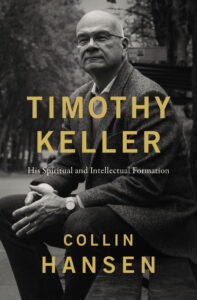 Timothy Keller: His Spiritual and Intellectual Formation Colin Hansen (Zondervan Academic) $26.99 OUR SALE PRICE = $21.59
Timothy Keller: His Spiritual and Intellectual Formation Colin Hansen (Zondervan Academic) $26.99 OUR SALE PRICE = $21.59
Although it came out before Keller died this past May, there was an urgency about reading it as many knew his time was nearly up. Even the secular, mainstream media covered his passing, indicating he was an important figure in culture, representing (as most BookNotes readers would know, even if not all agree with his orientation) an enlightened sort of gracious kind of evangelicalism, taking a winsome but intellectually serious faith into the public squares, making a case for faith lived in the marketplace. He appealed to those with justice sensibilities (even if he didn’t go far enough for some) and he appealed to those with a need for clarity about Reformed doctrine and theological details, which he had in spades. He was cultural astute, philosophical wise, quoted Tolkien and befriended abstract artist Mako Fujimura. I will never forget being at Redeemer in Manhattan when he hosted and dialogued with the great civil rights attorney Bryan Stevens. How did a guy who loved his theology and doctrine end up working it out in the midst of one of the great urban centers in the world, starting up a highly regard “Center for Faith and Work”?
This book explains it all. It explores his faith and formation, the books he read, the scholars he esteemed, his work in seminary and his early church ministry. As he sensed a call to Manhattan, the plot thickens and Hansen expertly explores the details of how Tim and his wife studied and learned and preached and prayed their way into helping launch a globally respected church in one of the most secular regions of North America.
Agree or not with Keller on any number of theological or strategic topics, this intellectual biography is admirable as it shows what happens when one family ordinary Pennsylvania Lutheran kid decisively responds to the gospel in college and dedicates himself to Kingdom service. It is interesting, instructive, commendable.
BEST BOOKS ON CREATIVITY and the AESTHETIC
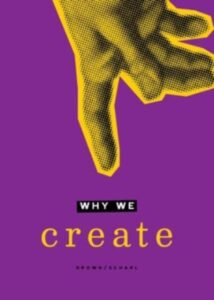 Why We Create edited by Brian Brown & Jane Clark Scharl (Square Halo Books) $16.99 OUR SALE PRICE = $13.59
Why We Create edited by Brian Brown & Jane Clark Scharl (Square Halo Books) $16.99 OUR SALE PRICE = $13.59
This book is small — a smallish compact size — and yet is so thoughtfully done that it absolutely takes its stand next to much larger, verbose, and costly volumes. It is lovingly produced by the Anselm Society and (as I said in a rave review earlier this year at BookNotes) it includes writers, visual artists, theologians, and thinkers who offer life-giving insight about the creative life. Why do we create? And what is involved in the creative process? Listen to the likes of Marilyn McEntyre and Leslie Bustard ruminate on that, framed by foundational theological stuff (in the section “God creates”) by Hans Boersma, Peter Leithart, Jane Scharl and Paul Buckley. Some of these authors have crafted their own good books (Grace Olmstead, for instance) or are themselves artists (Matthew Clark, for instance.) The heavyweight critic Anthony Esolen offers a moving Epilogue.
In 2021 Square Halo produced a similarly sized, lovely and wise little volume called Naming the Animals: An Invitation to Creativity. I loved that one by Stephen Roach. This is a bit more sophisticated in tone and is a brilliant follow up. Kudos one and all.
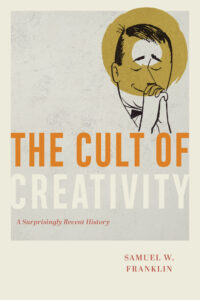 The Cult of Creativity: A Surprisingly Recent History Samuel W. Franklin (Chicago University Press) $26.00 OUR SALE PRICE = $20.80
The Cult of Creativity: A Surprisingly Recent History Samuel W. Franklin (Chicago University Press) $26.00 OUR SALE PRICE = $20.80
I have pondered this book long and often and recall the electric sort of joy of discovery while reading it, nearly unsurprised this year, reading something that I literally knew nothing about, and taking it in, page by splendid page. Who knew this stuff about the history of the notion of creativity, and where it came from? It is, or so Franklin argues, as the subtitle puts it, “a surprisingly recent” history. Kudos to this very good writer for offering this survey of something that has oddly not been studied that carefully.
You will have to read it yourself but (as one reviewer explained) “after World War II a fascinating ensemble of psychologists, advertising executives, and other assorted gurus attempted to explain and quantify human ingenuity.” But why? Was there something that might even be called sinister afoot? The ideas and practices, programs and technologies became, surely, what we might call an ideology, and it is playing out all over today, from the design world to high tech, from self-help messiahs to bohemian hipsters creating the latest aperitif. I’m riffing in a way that he does not, restrained scholar that he is, but I really appreciate this cultural historian (from Holland!) A bit heady, but, man, this provided one of the best serious reading experiences I had this year. Hooray.
BEST BOOKS ON CHURCH LIFE
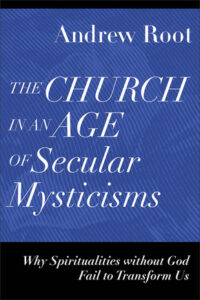 The Church in an Age of Secular Mysticism: Why Spirituality without God Fail to Transform Us Andrew Root (Baker Academic) $28.99 OUR SALE PRICE = $23.19
The Church in an Age of Secular Mysticism: Why Spirituality without God Fail to Transform Us Andrew Root (Baker Academic) $28.99 OUR SALE PRICE = $23.19
I hope that you know the mighty, five volume “Ministry in a Secular Age” series produced over the last few years by Luther Seminary prof Andrew Root. Much has been written about them all and this capstone is not only the final release in this series but in many ways the best. It offers some good summary of the whole project and, as do the others, interacts with some of the most important philosophers of culture writing today. He is creative and upbeat even when he is rigorous in explaining philosophical notions. It is — hooray! — an insightful blend of theology, philosophy, cultural studies, Biblical reflection, and a bit of practical application for the ordinary, local congregation.
As Angela Reed of Truett Seminary notes, he is “a gifted practical theologian” and he “invites us to wrestle with the nature of historical and contemporary mystics in the Western world..” I’m not sure if it is immediately clear why a Theo-philosophical critique of contemporary (godless) mysticisms is “practical” but if you hang in there with him, it will become evident. Can we reclaim our classic convictions about the cross offering the only path for the transformation of the self? Can we reject a secularizing sort of mysticism that is stripped of transcendent power and Christian discipleship? Can we learn to center the practices of confession and discover authentic grace and gratitude and surrender?
Reed calls all of this the work of a “practical theologian” because, simply put, Root is asking how to do ministry in a world such as ours and, frankly, how to do ministry with those who say they are “spiritual but not religious.” That alone deserves a Book of the Year award. Cheers!
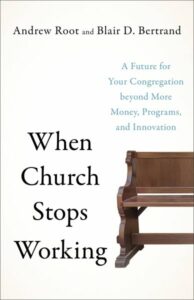 : A Future for Your Congregation Beyond More Money, Programs, and Innovation Andrew Root & Blair D. Bertrand (Brazos Press) $21.99 OUR SALE PRICE = $17.59
: A Future for Your Congregation Beyond More Money, Programs, and Innovation Andrew Root & Blair D. Bertrand (Brazos Press) $21.99 OUR SALE PRICE = $17.59
I am a bit reluctant to celebrate this honorable book because I don’t want you to skip the magisterial volumes of the “Ministry in a Secular Age” series, and certainly not the above-mentioned The Church in an Age of Secular Mysticism. This little book does not replace that big one.
But yet, it is wise that this When Church Stops Working released this year as it is exactly the sort of book of which there are so many — a practical guidebook to stimulate busy church leaders with actionable ideas for congregational renewal and health — but it is informed by the serious cultural analysis developed in the five big books that preceded it.
I hear that the backstory is something like this: Blaire Bertrand (himself with a PhD from Princeton Theological Seminary) has done church consulting in all sorts of places (including Malawi, Africa) and knows a thing or two about integrating a thoughtful framework with practical stuff ordinary church leaders can try. He seems to have approached the heady Dr. Root and said, in so many words, “let’s do this!” So, here, they show how the habits of “watching and listening for God” can bring life out of death for churches in crisis today. The solution (if we’ve been paying attention to Roots magisterial project) isn’t “more money, people, programs, innovation or busyness.” It “rejects pithy slogans and slick approaches” of course, but approaches the crisis of church decline is (first) a better diagnosis and secondly, as Mandy Smith puts it in her back cover blurb, “a helpful, human way forward.”
I think it may be that some of what Root and Bertrand rail against as gimmicks or formulas aren’t as bad as all that; is every innovation driven by the spirit of the age? But for those drawn to that sort of quick fix, this call to return to God, first, could be life changing. It’s the best practical book of church health stuff I’ve seen all year. And it’s fun, too — maybe you saw the neat excerpt that appeared in the latest edition of Comment magazine. Wow.
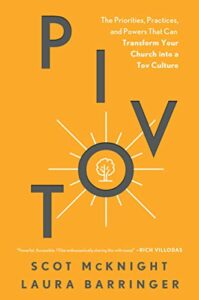 Pivot: The Priorities, Practices, and Powers That Can Transform Your Church Into a Tov Culture Scot McKnight & Laura Barring (Tyndale) $22.99 OUR SALE PRICE = $18.39
Pivot: The Priorities, Practices, and Powers That Can Transform Your Church Into a Tov Culture Scot McKnight & Laura Barring (Tyndale) $22.99 OUR SALE PRICE = $18.39
A year or more ago the great book A Church Called Tov came out, exploring that Hebrew word (for a rich and healthy sort of “goodness” and more) and how the local congregation should exhibit this kind of safe, flourishing, gracious, good kind of culture. It was excellent, thoughtful enough, and practical, or at least a bit. It documented the problem with bullying and abuse in churches and offers the “tov” image as a motivating Northstar by which to guide efforts at renewal. There was already in the works a sequel, a guidebook for living it out, for transforming the sub-culture, offering a glimpse of a better environment and a more wholesome “good” tov ecology in one’s church or ministry organization.
The cover design of Pivot shows a great play on words — it is a fabulous sequel, invigorating and provocative, even as it is realistic and sober. Throughout it is practical and do-able, complete with “tov tools” and assessment guides. with God’s help, you can do this! We must build a culture that would be able to spot red flags and cultivate goodness.
Pivot is a prophetic invitation to move. Move towards healing, move toward the light, move toward being the change that is so needed right now. This is exactly what I pray for — the wisdom and clarity to move toward wholeness together. — Danielle Strickland, author, Better Together
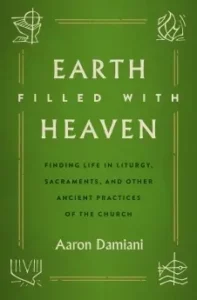 Earth Filled with Heaven: Finding Life in Liturgy, Sacraments, and Other Ancient Practices of the Church Aaron Damiani (Moody Press) $14.99 OUR SALE PRICE = $11.99
Earth Filled with Heaven: Finding Life in Liturgy, Sacraments, and Other Ancient Practices of the Church Aaron Damiani (Moody Press) $14.99 OUR SALE PRICE = $11.99
It is a happy, cool day when the publisher world’s standard habits are upended just a bit and we honor this book (and their publisher) for this 2023 surprise. As I said when I first reviewed it at BookNots, Aaron Damiani is an urban Anglican priest (and first came to our attention when he wrote a book about Lent called The Good of Giving Up written for those without liturgical or sacramental leanings.) As a former fundamentalist, he has discovered the depth and beautify of Anglican worship and a sacramental worldview, as Alexander Schmemann might put it. Earth Filled With Heaven is a book about liturgy and other sorts of ancient practices as exercises within more liturgical congregations and traditions.
I am not a high church guy and don’t worship at a particularly formal liturgical church (although we are traditionally mainline Presbyterian.) So I’m not saying this was a favorite because it convinced me to start attending an Episcopalian or Anglo-Catholic service, but because this focus on the sacramental Jesus and the meaning of the Lord’s Supper and baptism and the church calendar was edifying and helpful.
As it says on the back, “while secular life erodes our humanity, practicing the sacramental life shows us how to recover it. Enter and experience an enchanted Earth Filled with Heaven.” I dig that. This is a handsomely done book — with some colored ink — and we want to celebrate the spiritual rhythms and ancient church orientation it promotes. Perfect for newbies or for old time liturgists who need a fresh reminder of what this style of worship and faith-formation can be. Lovely, healthy stuff.
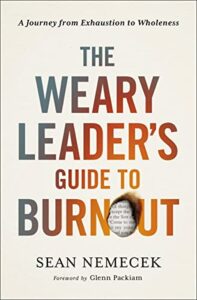 The Weary Leader’s Guide to Burnout Sean Nemecek (Zondervan) $19.99 OUR SALE PRICE = $15.99
The Weary Leader’s Guide to Burnout Sean Nemecek (Zondervan) $19.99 OUR SALE PRICE = $15.99
Every year there are, increasingly, even, new books on resilience for clergy, for healthy patterns of work, for renewal. Just this week a pastor noted to me that few of their flock had any idea the weight they carry, the human toil of serving the church. We have any number of good books refocusing pastors on the point of all this, and how to do it well. (Think of Justin Writebol’s recent Lexham title, Pastor, Jesus Is Enough: Hope for the Weary, the Burned Out, and the Broken or last year’s award winning The Resilient Pastor by Glenn Packiam, or an older gem, The Imperfect Pastor by Zack Eswine, or a personal favorite by the wise, honest, Mandy Smith called The Vulnerable Pastor.)
The Weary Leader’s Guide to Burnout, though, stands as one of the best such books I read this year. Therapist Chuck DeGroat calls it “exceptional” and other rave reviews remind me that I’ve got to name this as one of our Best of the Year titles. I can’t imagine anyone who wouldn’t benefit from it. Maybe you should order more than one.
The Weary Leader’s Guide to Burnout is essential reading not only for those who are experiencing exhaustion but for all who have been called to ministry leadership. Nemecek writes with the practical and compassionate wisdom of lived experience, offering theological and psychological insights, compelling stories, and spiritual practices that help us cooperate with the Holy Spirit for transformation and freedom…. Sean holds up mirrors so we can see our compulsions and captivities, and with that healed vision, see more clearly the invitations from Jesus to rest in his love and yield to his grace. — Sharon Garlough Brown, spiritual director, author of the Sensible Shoes and Shades of Light series
BEST BOOKS ON PERSONAL GROWTH & PSYCHOLOGY, ETC.
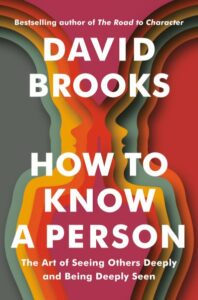 How to Know a Person: The Art of Seeing Others Deeply and Being Deeply Seen David Brooks (Random House) $30.00 OUR SALE PRICE = $24.00
How to Know a Person: The Art of Seeing Others Deeply and Being Deeply Seen David Brooks (Random House) $30.00 OUR SALE PRICE = $24.00
I know a few people don’t quite trust David Brooks — he used to be much more right-wing than he is now, and he can be a bit sophisticated at times. But I really respect him and have read all of his books; when I highlighted this when it first came out I think I resisted how much I loved his splendid sociology of younger rich folks who have bohemian values even if they are bourgeois. “Bobos”, he called them. Genius!
This is brilliant and, frankly, a very good bit of reflection on any number of things needed in our culture these days. From the loneliness epidemic to the overt alienation people feel from their churches or other institutions these days, from the political and social polarization to a generation of young adults who have not been given standard tools of personal or civic etiquette, we all need to know a bit about being known. And more how to make others feel known.
This is a deeply Christian book even though I am sure it isn’t pitched like that. But if the gospel of God’s grace is the truest truth, then we can look at the glorious ruins we all are — that is, ourselves and our loved ones, our neighbors and even those we despise — as made in God’s image and deserving of care. How do we really care? And show that we care?
Mr. Brooks is a pundit, a sociologist, a trend-observer, a politico and very good writer of columns from places like The New York Times and his perch on PBS. That he developed a friendship with several thoughtful evangelicals (not least, with the late Timothy Keller) in recent years seems to show, informing his concerns about “knowing” and “caring” with this mostly implicit gospel grace. Brooks is famously curious, wants to know what makes the world tick, and wants to listen to others. The fruit of that in these recent years is this exceptional, profound book, inviting us to better conversations, forming communities of care, learning to even bear the burdens of others when we can.
This is surely one of the great books of 2023.
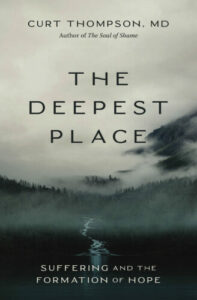 The Deepest Place: Suffering and the Formation of Hope Curt Thompson (Zondervan) $27.99 OUR SALE PRICE = $22.39
The Deepest Place: Suffering and the Formation of Hope Curt Thompson (Zondervan) $27.99 OUR SALE PRICE = $22.39
As I said when I first reviewed this at BookNotes, I am a Curt Thompson champion, a fan, a cheerleader for his good books. His previous three are among the most recommended books whenever conversations move in the direction of this sort of psychological advice. But I admitted that when I heard that The Deepest Place was more directly about suffering and resilience (about which so much has been written lately) I was almost (almost) worried. What new could Curt bring to this well-worn topic? Do we need yet another book on this topic?
Man, was I wrong. The Deepest Place touched me at my deepest places and his call to the formation of hope was some of the best stuff I’ve read on that, ever. He has laid out his profound framework (using the Bible and neurology) in his previous masterpieces and now this stands alongside those as must reads. It is one of the best books I read this year and is happily here on our list of favs. It is, trust me, very helpful.
With his formidable intellect and compassionate heart, Curt Thompson draws from Scripture, neurobiology, and inspiring stories to help people advance on the path from suffering to hope and redemption. This is a spiritual formation tour de force for anyone ready to look life’s inescapable pain in the eye and make something better of it. A must-read. — Ian Morgan Cron, author, The Story of You
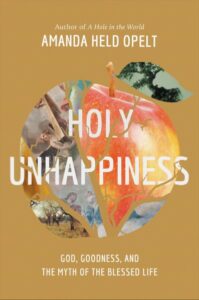 Holy Unhappiness: God, Goodness, and the Myth of the Blessed Life Amanda Held Opelt (Worthy) $27.00 OUR SALE PRICE = $21.60
Holy Unhappiness: God, Goodness, and the Myth of the Blessed Life Amanda Held Opelt (Worthy) $27.00 OUR SALE PRICE = $21.60
When I first announced this, I highlighted how very much I liked Opelt’s previous work, a really good book on various ways that various cultures have developed mourning practices. It was a fabulous read, a wise and helpful book, evolving from her own experience of loss when her beloved sister, author Rachel Held Evans, died so suddenly.
This book is equally well written, delightfully honest, at times real and raw, about being honest with oneself and honest before God about less than pleasant feelings or attitudes. This is not quite a memoir although she shares very nice writing about her own interior life, and it isn’t exactly a book of psychological self help. I like this blend of genres, this sharing of her journey, that doesn’t feel formulaic or simplistic. I am not alone, either, in appreciation. Others we respect have said very impressive things, assuring me I’m not wrong to name this as one of our favorite books of 2023.
Holy Unhappiness is the gospel for our pain and difficulty. I can’t commend the tenderhearted approach that Amanda embodies here enough. A balm for the soul. And hope for our scars. What a glorious read. — A.J. Swoboda, professor of Bible, theology, and World Christianity, Bushnell University, author of After Doubt.
Amanda’s lovely blend of reflection and memoir flows from a heart acquainted with grief and unsatisfied with the cheap remedies our churches and culture too often prescribe. This is a work of immense honesty and prophetic clarity. — Chuck DeGroat, Professor of Pastoral Care and Christian Spirituality, Western Theological Seminary, author, Wholeheartedness: Busyness, Exhaustion, and Healing the Divided Self
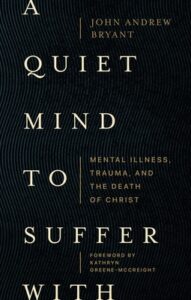 A Quiet Mind to Suffer With: Mental Illness, Trauma, and the Death of Christ John Andrew Bryant (Lexham Press) $19.99 OUR SALE PRICE = $15.99
A Quiet Mind to Suffer With: Mental Illness, Trauma, and the Death of Christ John Andrew Bryant (Lexham Press) $19.99 OUR SALE PRICE = $15.99
There are a number of faith-based books about mental illness, various sort of memoirs and evaluations, about those suffering with various concerns, from depression to bipolar disorder. This is one that is so very good in part because it is both exceptionally well written — Bryant really is a creative writer, and Wes Hill has described it as harrowingly frank — and because of how it so naturally integrates a faith in the gospel of Christ and the realities of his own traumas and disappointments. This story is candid about his illness and foibles (and how that feels to him) and it is honest about the broader social context and his life’s situation (he was not accepted into a ministerial program he had hoped for.) This young writer has much to offer and we are grateful for the handsome, thoughtful book.
The useful forward is by Kathryn Greene-McCreight, an Episcopal priest whose own Darkness is My Only Companion is a contemporary classic.
BEST BOOK FOR ROCK AND ROLL LOVIN’ BABY BOOMERS
 Bridge and Tunnel Boys: Bruce Springsteen, Billy Joel, and the Metropolitan Sound of the American Century Jim Cullen (Rutgers University Press) $31.95 OUR SALE PRICE = $25.56
Bridge and Tunnel Boys: Bruce Springsteen, Billy Joel, and the Metropolitan Sound of the American Century Jim Cullen (Rutgers University Press) $31.95 OUR SALE PRICE = $25.56
Okay, I’m just going to say it: nothing beats Bono’s book of last year, his stirring memoir, Surrender, which made me weep with joy. And, as much as I hate to admit it, I adored the big fat memoir that came out last year by Rolling Stone magazine founder, Jan Wenner’s Like a Rolling Stone. I like books about pop culture and rock music and the like. I just wasn’t sure if any that I read this year was award-worthy.
And then I read this — thanks to Springsteen fanatic, historian John Fea, who had ordered one from us. I really loved early Billy Joel, especially, and wondered how this author (who I had previously read on Springsteen) compared and contrasted and related the two. And what does “bridge and tunnel” mean, anyway?
Cullen is not your typical rock biographer or fanboy but is an esteemed historian, so when a reviewer says this is “thoughtful and probing” he means it is not just for fans, but it is “a work that evokes a broader sense of the time and place in which the music was made, and how that music continues to influence the wider culture.” (Fred Schruers.) The great Tom Perrota loves it and notes that it is both entertaining and provocative, and should “appeal to anyone interested in pop music and its relationship to the historical currents that influence its creation.” Love it!
THE BEST BOOK OF 2023 ABOUT COLLEGE LIFE
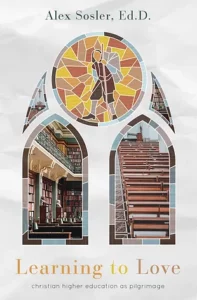 Learning to Love: Christian Higher Education as Pilgrimage Alex Sosler (Falls City Press) $18.99 OUR SALE PRICE = $15.19
Learning to Love: Christian Higher Education as Pilgrimage Alex Sosler (Falls City Press) $18.99 OUR SALE PRICE = $15.19
I know, I know, not every Best Books of the Year lists have a category specifically for young adults about their journey through college, let alone from a distinctively Christian perspective. But you know part of the origin story of Hearts & Minds — we used to work for the CCO in Western Pennsylvania helping college students get a vision for their lives where their learning in college was somehow related to their alliance to God’s Kingdom, so that they could discern visions of vocation, someday serving their neighbors and making a difference as butchers, bakers, and candlestick makers, as the saying goes. Eventually CCO adopted a slogan that still animates their Jubilee conference (that Beth and I still serve with a large book display) saying that they express the gospel in ways that “transform college students to transform the world.” That’s audacious, eh? It’s the DNA in our bones, too offering books that might transform readers so they might transform the world.
And so, we are always on the lookout for books for college age students, for CCO workers (and other parachurch ministries like IVCF, DiscipleMakers, Cru, and the like) and congregations near churches that they can easily use with their students to help them understand that they must think Christianly about their learning and see their experiences within institutions of higher learning as deeply related to their own spiritual formation. We need books like this since (let’s be honest) not many churches tell their youth that or mentor collegiates in this vision.
I guess I should admit I helped a tiny bit with some minor editing with this remarkable volume; I did so because I believed in it even in early manuscript form. I love the author and I love this book. It does a simple thing or two with such verve and insight (and breadth of learning) that any college student would benefit from picking it up. And it is pleasurable reading, fun, even.
The things it does are simple enough, but I must say something that will qualify it just a bit; here goes: the book is designed to help first year college students who are attending a church-related or Christian college to see their moving through their college experiences as a pilgrimage. Sosler (who is a professor at Montreat College in Black Mountain, NC) guides kids through this idea of pilgrimage, a journey, a process, a movement of being formed to want the right stuff. Drawing on Augustine (and, more hip, Jamies Smith’s You Are What You Love) he shows how amidst all the classes and extracurricular activities, friends, and mentors one finds in the college years, it is best seen as a journey towards redeemed desire. Oh man, this is revolutionary, and very, very cool.
Here’s the switcheroo that I want to make: it is written for use in Christian colleges but it is so good that I want to say that with the explanation and caveat needed, any student could appreciate it, whether they are at an small, private, liberal arts college or a major, pluralistic university. With the easy-to-read talk about virtue and character formation, pilgrimage and deep ways to know things, I think even a secularized professor would agree: students that search for meaning in their learning, framing it all with the call to love, will surely be better learners and happier students. Want your student to “get” a reason for being in college: give them this fine introduction to some stuff I would bet they have never heard before.
And, by the way, college profs? Any of you out there reading along? Check out Learning to Love to see if your teaching and demeanor are consistent with this high calling of the role of education as mentoring students into a life of care and calling.
Citing everybody from Wendell Berry to Steve Garber, from Parker Palmer to Jamie Smith, from Esther Lightcap Meek to varied saints and mystics from long ago, Sosler makes the text interesting, and, insofar as he exposes wrong ideas and values and style of learning, he is offering something radical. In the very best way. Extra credit, too, for the fabulous questions at the end of each chapter inviting students to ponder the personal implications of all this talk about learning to love. Even if they just grapple with some of those, the investment will be worth it. This author deserves a medal and this book deserves lots of attention. Three cheers!
BEST 2023 BOOK ON THE LIBERAL ARTS
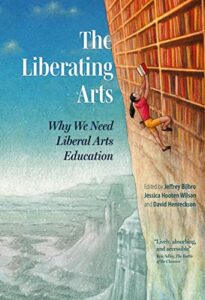 The Liberating Arts: Why We Need Liberal Arts Education edited by Jeffrey Bilbo, Jessica Hooten Wilson & David Henreckson (Plough Publishing House) $19.95 OUR SALE PRICE = $15.96
The Liberating Arts: Why We Need Liberal Arts Education edited by Jeffrey Bilbo, Jessica Hooten Wilson & David Henreckson (Plough Publishing House) $19.95 OUR SALE PRICE = $15.96
I have rambled on about this at BookNotes and before live audiences this past year and it is a book that, admittedly, is not of immediate interest to everyone; it is about college and learning and the power of the liberal arts. Granted. But my guess is that if you are reading this you know somebody connected to higher education and may, yourself, have great opinions about being a life-long learner. You read fiction and poetry and — if you are a typical BookNotes fan — lots of nonfiction, religious and otherwise. Welcome to the world of ongoing education. We read, we learn, we grow. You will love this book.
Plough is a tremendous, thoughtful, delightful publishing house that does classy little books on all sorts of topics. (I hope you know their excellent, stimulating, journal that comes out weekly online and in a quarterly glorious print journal.) Here they bring together more than a dozen fabulous writers weighing in on why we should love to learn, what the liberal arts have historically been about, why many in higher education have drifted from this classic perspective. Does our consumeristic, secularizing culture effect how we think about learning? What can be done? Listen in to really smart, faithful, authors and join this urgent conversation. For many of us, this surely is a great read for 2023 and beyond. Hooray. Contributors include Anne Sander, Steve Prince, Lydia Dugdale, Noah Toly, David Hsu, John Mark Reynolds and many more.
FAVORITE BOOKS ON DAILY DISCIPLESHIP
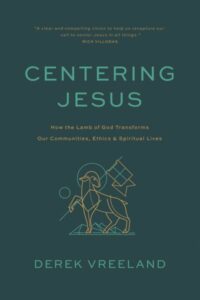 Centering Jesus: How the Lamb of God Transforms Our Communities, Ethics, & Spiritual Lives Derek Vreeland (NavPress) $17.99 OUR SALE PRICE = $14.39
Centering Jesus: How the Lamb of God Transforms Our Communities, Ethics, & Spiritual Lives Derek Vreeland (NavPress) $17.99 OUR SALE PRICE = $14.39
I have tried to promote this before and it seems at once nearly self-evident that this is what the gospel entails — focusing on Jesus — but yet in these days (like most eras, I guess) we need to be reminded. Too quickly our worldviews are synthetic, a mix of this and that, maybe a bit of Bible and a bit of American self help, or a bit of Jesus and a bit of Trump, or a commitment to faith but, well, milquetoast respectability (let’s not get too carried away.) Look, if Jesus is Lord, he is, well, Lord. This book explores this. That he reminds us that the Bible refers to Jesus as the “lamb of God” suggests something pretty counter-cultural, nonviolent, even?
Vreeland reminds us that “when we lose our focus on Jesus, the church’s credibility suffers.” We can agree on that much, can’t we? That Jesus teaches us to love relentlessly, too, we can agree on that, right? So how might knowing Jesus — at the center of our lives— as the Lamb, ushering in an upside down Kingdom, help us be more faithful and glad in our daily discipleship? I like how he offers some pretty radical and grand ideas, but brings it down to key areas of our ordinary lives, our morals, ethics, our common life together in the church, and the like. This is a book about spiritual formation, about the “inside out” formation of character and virtue, and how this shakes down. As Tony Evans has been known to say, Jesus, when He returns, won’t be riding a donkey or an elephant and that is the serious last chapter of this fabulous book. Give it a try; there are good discussion questions, making it a perfect sort of thing we need, centering Jesus. I’ll award that, for sure!
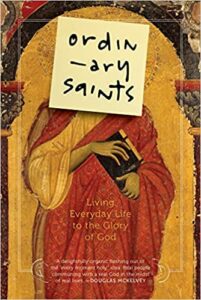 Ordinary Saints: Living Everyday Life to the Glory of God edited by Ned Bustard (Square Halo Books) $24.99 OUR SALE PRICE = $19.99
Ordinary Saints: Living Everyday Life to the Glory of God edited by Ned Bustard (Square Halo Books) $24.99 OUR SALE PRICE = $19.99
Am I allowed to nominate for a Hearts & Minds Best Book award a volume in which I have a chapter? I almost forgot that little “conflict of interest” thing until I started paging through it (once again) to see what I might highlight to illustrate why it deserves a truly honorable mention. Okay, so what? There you have it: I’ve got a piece in here and I don’t know if it is award winning, but it’s pretty darn good, about the details of running a retail operation, thinking Christianly and behaving normatively in the nitty-gritty of selling stuff.
You see, that is what makes this book so very deserving of a “Best Book” award — every chapter is down and dirty, real, honest, and, often, a load of fun. The book is as eccentric as they come, offering God-drenched chapters on what it looks like to honor the Lordship of Christ, giving God the glory, in the little details of life. From work to play, hobbies to research, happy stuff and tragic stuff, each author shares how they glorify God as ordinary saints in God’s good but broken world. I am confident when I say that there is nothing like it. At all. Square Halo Books deserves an award just for coming up with the idea of this. They deserve another for pulling it off so well.
In my earlier reviews I explained that there are a few famous people here, a few friends, and a lot of ordinary people who you’ve never heard of. And they pen excellent pieces about Christian perspectives on, and Godly motivation for, everything from raising chickens to roller skating, drawing comics to collection serious art, from lovemaking to knitting, we discover here something not only about giving God glory in all things, but we discover something here about the sanctified notion of being fully human. Who wouldn’t want to be glad to read about the joy one takes in karaoke, home repairs, or picking the best briefcase? How about Malcolm Guite writing about his pipes? And who won’t be inspired by. Reading about those who find the capacity to honor God while coping with mental health issues or reflecting on the hardships of grand parenting, or living through chronic pain?
In a way, this book is a tribute to much of what Ned and the late Leslie Bustard and their colleagues (A.D. Bauer and Diana DiPasquale, who both have excellent chapters here) have been doing for twenty-five years, managing this niche, little publisher in Lancaster, PA, raising up the goodness of art and creativity done by “ordinary saints.” Kudos to them, and thank God for this fascinating, exceptional volume.
And, if I may, I think this is one of the coolest book-covers I’ve seen in a while. Yes!
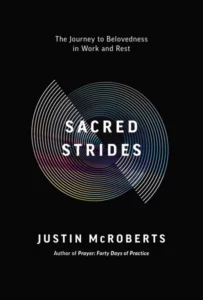 Sacred Strides: The Journey to Belovedness in Work and Rest Justin McRoberts (W Publishing Group) $18.99 OUR SALE PRICE = $15.19
Sacred Strides: The Journey to Belovedness in Work and Rest Justin McRoberts (W Publishing Group) $18.99 OUR SALE PRICE = $15.19
I have written about this extensively, and joyfully, because, well, one can’t write about this hoot of a book by this creatively fun guy, without having a blast. But I’m going to try to be sober and serious and succint.
I enjoyed this book immensely, read it twice, enjoyed it even more the second time, learned a lot and took great encouragement from what I got. It is worth your time, too. Justin is a good guide, a friend to many, a coach, podcaster, thought leader (and great singer-songwriter.) He may cite Thomas Merton and Parker Palmer but he also names some rock and roll lines, too.
Here’s what you should know about why I think Sacred Strides is a big cut above the average book on Christian book on living with God day by day. First, it is beyond upbeat, it is energetic, at times electric. He tells stories, makes you laugh, and sometimes may draw tears. Heck, he may draw blood. It’s a punchy, powerful book, direct, but gracious. Did I say he’s a great storyteller?
Besides the energy and its well-written tone — he has worked on his craft as writer over the years and each book keeps getting better — there is the faithful, wise insight, which, again, is not commonplace.
You know we appreciate the many books about rest, about sabbath, about rhythms of life, rules of life, silence and solitude and mindfulness and the like. I’ll be honest: I’ve read more than enough of these and maybe you have, too. I also have read (and celebrated — please see above) many about the Biblical call to work, the big picture of a vision of the Kingdom coming that relates to all of life. So, yes, we need to continually remind people of our holy calling to take up our jobs for love’s sake, as unto the Lord. But, you know what? Often these two kinds of books are at odds — those saying to do something, those saying to stop doing stuff; those that highlight the good we’re to be about, those that say our identity is not what we do, but that we should just be. Some try to resolve this dichotomy and talk about balance, but it never seems quite right.
Justin, in a stroke of genius, has figured out how to talk about these aspects of our creatureliness and the image he offers is the sacred stride with the needed posture to live it out well. This, friends, leads to an awareness of our belovedness and a whole lot of sanity.
“A full life in God,” he says, “is found and practices in work and rest.” And somehow, we do them together, not one, for a while and then the other for a bit. You’ll have to read this profound book to see how he explains this striding business, but it’s good. Very good. It is not only brilliant, but fun. Sacred Strides is one of the best books of the year for this sort of basic Christian living writing and, believe me, we need this more than you may even know. Buy a couple and give ’em out and see who else says it was one of their favorite reads of the year!
BEST POLITICAL BOOK THAT MOST SURPRISED ME
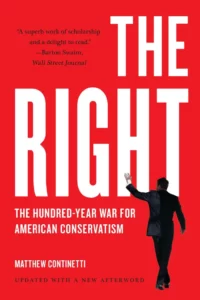 The Right: The Hundred Year War for American Conservatives Matthew Continetti (Basic Books) $19.99 OUR SALE PRICE = $15.99
The Right: The Hundred Year War for American Conservatives Matthew Continetti (Basic Books) $19.99 OUR SALE PRICE = $15.99
I could write pages about how much I learned from this excellent historical overview and why I think it is important, regardless of your political leanings. I’ve read a lot trying to figure out how the conservative movement imploded (and how some with conservative principles stood against the Republican Party to resist the very not-conservative Donald Trump.) Continetti is a bona fide conservative, even married into a family of a very respected journalist and thinker on the right. He knows his stuff.
I had little clear idea about the heritage of the right in American history (from one hundred years ago) and this upbeat telling of the tale of the development of varying political philosophies ends up being a page turner. When he gets to the McCarthy years, and the John Birchers and eventually Nixon, and on through Reagan and such, I couldn’t stop reading. Agree or not with his fair-minded in-house critique of his own tribe, The Right is a masterpiece and Continetti is a very, very good writer. This book deserves to be considered as one of the great books of political thinking in our time.
BEST BOOK ABOUT THE POLITICS OF AMERICAN EVANGELICALS
 The Kingdom, The Power, and the Glory: American Evangelicals in an Age of Extremism Tim Alberta (Harper) $35.00 OUR SALE PRICE = $28.00
The Kingdom, The Power, and the Glory: American Evangelicals in an Age of Extremism Tim Alberta (Harper) $35.00 OUR SALE PRICE = $28.00
This is a big book, reported with exquisite detail, by an author I immediately liked. I had not read his previous American Carnage about the rise and campaign and election of then President Donald Trump. As Alberta tells in the first chapter of this new one — that released mid December, so I’m not even finished with its almost 500 pages yet —he did a press interview for that book on CBN (the Christian Broadcasting Network.) He is himself an evangelical, his father a Gordon-Conwell grad and a respectable, good guy, but he worried what his dad would think with him being so candid about his disapproval of the President’s ethics.
Tim soon found out that his father had died unexpectedly while he was on the air, and within a day Tim was back in Michigan, mourning with his tight-knit, Christian family, at their home church. During the viewing, literally, by the casket, several people wanted to argue with Tim about his political views; he got nasty notes at the viewing, and it got ugly during the funeral. He couldn’t believe how ideological captured these church people were, and he decided to use his training as a political news investigator to explore how it came to be that so many white evangelicals got mixed up in all this despicable stuff. So began years of research and travel, and this excellent, important book.
Although very well known in the mainstream world of political reporting, Tim Alberta has maintained his faith and here he is writing about the religious landscape telling stories and exploring episodes and documenting his passionate insights. It is, in many ways (as the new York times Book Review said about his previous work) a degrading story. It is one we need to continue to follow and of the plethora of books on this very topic, this one is simply essential. Five stars!
H&M AWARD FOR UP-TO-DATE RELIGIOUS REPORTING
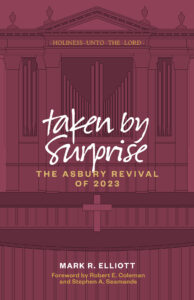 Taken By Surprise: The Asbury Revival of 2023 Mark R. Elliott (Seedbed) $18.95 OUR SALE PRICE = $15.16
Taken By Surprise: The Asbury Revival of 2023 Mark R. Elliott (Seedbed) $18.95 OUR SALE PRICE = $15.16
Dr. Eilliott is a retired history prof who knows a bit about the history of revivals and God’s renewing movements. Seedbed is an evangelical publisher that has arisen over the years in Asbury, emerging from the good Methodist seminary there and, of course, the college. The town — a very small place, with most of the population affiliated with the college and seminary — is the place which drew international attention last winter when a group of students felt led to stay in the chapel, which became one of the longest ongoing times of worship and praise and confession and renewal certainly in the last 100. Years. Hughes Auditorium became an extraordinary holy space and people flocked from all over the country and students had to figure how to manage the guests, seekers, and fellow worshippers. The inundation of thousands of pilgrims soon turned to tens of thousands. And the kids were alright.
This moving book documents the first sixteen days of round-the-clock, continuous worship and confession and the palpable sense of the nearness of God. The reality of the outpouring of God’s Spirit last February in this very unique way is undeniable and most inexplicable. This book tells the story and it deserve some very special attention; naturally, there are things I’d have wished were addressed but not every book can do everything. As Peter Greig (of 24-7 Prayer International) notes that Taken By Surprise offers “the facts and the essential DNA” of the outpouring. Kudos to Seedbed for releasing this less than a year after the event and doing such a nice job.
THREE FAVORITE BOOKS THAT DEFY SIMPLE CATEGORIZATION
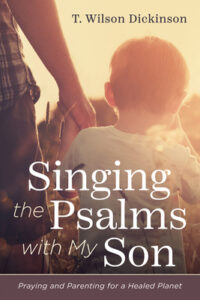 Singing the Psalms with My Son: Praying and Parenting for a Healed Planet T. Wilson Dickinson (Cascade) $23.00 OUR SALE PRICE = $18.40
Singing the Psalms with My Son: Praying and Parenting for a Healed Planet T. Wilson Dickinson (Cascade) $23.00 OUR SALE PRICE = $18.40
Oh my, this is a beautiful book, tender, honest, humble, and at times kind of funny. Dickinson “weaves meditations on individual Psalms with reflections on life as a parent.” And therein lies the rub. I bet a number of publishers loved this author’s writing chops and I’m sure many appreciated his profound religious faith. And who doesn’t know that books about eco-theology and a faith response to the climate crisis aren’t timely enough to maybe sell a few? But this? Bible reflections and memoir, parenting and pollution, Psalms and prayer? This is a reader’s delight, a lovely account of life as it is lived — multi-dimensionally, down-to-Earth, messy and playful and real.
As it says on the back,
“We accompany Dickinson and his son as they find the sacred and revolutionary possibility of ordinary activities — like reading children’s books, playing in the backyard, and celebrating holidays. Coupled with guidance for personal and communal use, these meditations invite us to harness the power of parental love and childish wonder to work for a hopeful future.”
I guess you can see why, quirky bookseller that I am, I had to name this as one of our favorite books of last year. Hooray and hooray again!
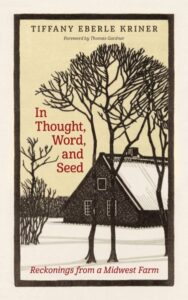 In Thought, Word, and Seed: Reckonings from a Midwest Farm Tiffany Eberle Kriner (Eerdmans) $19.99 OUR SALE PRICE = $15.99
In Thought, Word, and Seed: Reckonings from a Midwest Farm Tiffany Eberle Kriner (Eerdmans) $19.99 OUR SALE PRICE = $15.99
We’ve raved about this in a previous BookNotes so if you were betting on whether this would turn up in this big Best Books list, you win. How could we not list it — it was so luminously rich, so lovely, so well-written and thoughtfully conceived that I had to keep reading. The question is, do we put it under memoir, under agriculture and farming, or in our literary criticism section.
I suppose it is a memoir, the story of a college lit prof and her husband buying some land and learning to care for it, but since it offers exegesis of poetry and glimmers of politics and insights about land use, it isn’t a typical sharing of ones interior life and times. It isn’t Wendell Berry, exactly, and offers not only beautiful nature writing, although you could be forgiven for thinking of Aldo Leopald or Annie Dillard. It is a nicely crafted collection of essays that are intertwined — so maybe it goes with essays.
Theology prof Beth Felker Jones hints at the diverse genres operative here:
Kriner is fearless in her exploration of the difficulty of place and land in a peripatetic and racially scared America. Here are shades of Wendell Berry, Annie Dillard, and Julian of Norwich, but In Thought, Word, and Seed, has, first, a voice all it’s own. Luminous. Audacious. Holy.
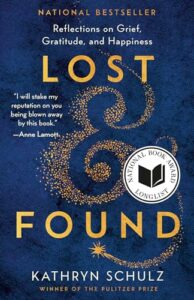 Lost & Found: Reflections on Grief, Gratitude, and Happiness Kathryn Schulz (Random House) $19.00 OUR SALE PRICE = $15.20
Lost & Found: Reflections on Grief, Gratitude, and Happiness Kathryn Schulz (Random House) $19.00 OUR SALE PRICE = $15.20
While one review declared that the writing in this book is “sublime and compassionate”, Oprah Daily said it “exemplifies the best of what memoir can do.” However, it isn’t a straight memoir, although that is the genre, I guess. As Schulz carefully narrates the story of her grief over the death of her (colorful, beloved) father, and tells the story of her falling in love with the woman who became her partner, she goes for pages —pages and pages — explaining the science and myths about losing things, about the facts and stories about finding things. How curious, and what fun! She writes beautifully about the various sorts of human experiences that make up happiness (and how that figures in to losing and finding things.) This stuff is captivating, elegant, interesting, and rings true in all the ways that matter most. She writes about her simultaneous experiences of wild joy and terrible grief. Yep, it’s all here.
Again, there is social history and excursions that flow naturally from her narrative into science experiments and literary studies. As a professional writer (for The New Yorker) she knows her way around good prose and, indeed, won a Pulitzer Prize for a previous book. So I recommend this to anyone who just loves endearing writing — not sentimental, even if about love lost and found —and who will glory in her finely tuned and often complex sentences. As it says on the back cover it is a memoir, but also “part guidebook to sustaining wonder and gratitude even in the face of loss and grief.”
She makes it clear in unpretentious and plainspoken ways that she is not a believer. (Her family was Jewish, many killed in the holocaust, and that itself is part of the plot.) Yet she speaks of religion and certainly the quest for spiritual truths throughout in a way that often made me nod. And when she falls in love with a person “whose first and most abiding relationship in life is with Jesus” (which she wouldn’t have supposed “in my wildest imagination”) she takes it in stride, despite their very different cosmologies.
Do you believe in love at first sight? What does that even mean? Do you enjoy those who tackled such questions bit by bit, interviewing gorgeously honest writing and fascinating social science, leveling with fabulous storytelling? This book is a gem. It came out first in 2022 (and won the National Book Award) but we got it when the paperback came out in 2023, so I am naming it as a personal fav here, now, a luminous set of essays on disappearance and discovery.
BEST BOOK I DIDN’T READ
 Zero at the Bone: Fifty Entries Against Despair Christian Wiman (Farrar, Straus & Giroux) $30.00 OUR SALE PRICE = $24.00
Zero at the Bone: Fifty Entries Against Despair Christian Wiman (Farrar, Straus & Giroux) $30.00 OUR SALE PRICE = $24.00
I’m not going to lie: we had a good handful of these in the shop but we had more pre-orders than we expected and our small batch was gone the day it arrived. I swear, I didn’t even open the cover. It released officially in early December and the publisher (and every other store in America, I gather) has been out of stock ever since. We will get more within the week, we are told. So, nope, I’ve not even touched the thing.
But we’ve long admired Wiman as poet and thinker, memoirist and writer. And all that we’ve read about this impressive new book has led us to believe it is truly one of the great contributions to the literary world published this year. From the interviews and reviews, the endorsements and media conversations, I’m confident that this is important. I’m sure it is excellently crafted and very well-written. I don’t know if I’ll love it, so I’m not listing it as a personal favorite (although I assume it will be.) But I can say this: it is a major release by a leading public intellectual who has spoken clear-headed Christian truth in one way or another. With blurbs on the back from the likes of Marilyn Robinson, you don’t need my hoopla to convince you, now do you? Amazing! I think…
Besides the clever line in the New York Times “editor’s choice” rave, saying Wiman could “charm an atheist out of a tree”, hear this, from The New Yorker:
Wiman is among the most distinguished Christian writers of his generation . . . Now he hopes that his experimental book — part poetry anthology, part memoir, part theological treatise — can help others live . . . The rewards for readers are immense and renewable. Word by word, Wiman resuscitates ancient ideas, from being to spirit, leaving our faces pressed hopefully against the here-and-now window of the poem.
BEST BOOKS ABOUT JUSTICE
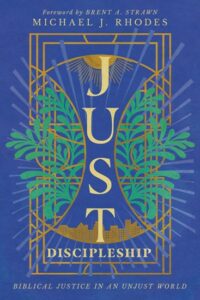 Just Discipleship: Biblical Justice in an Unjust World Michael J. Rhodes (IVP Academic) $32.00 OUR SALE PRICE = $25.60
Just Discipleship: Biblical Justice in an Unjust World Michael J. Rhodes (IVP Academic) $32.00 OUR SALE PRICE = $25.60
There are bunches of shorter, simpler, books about social justice in our faith tradition and for those just starting out something like What Does Justice Look Like and Why Does God Care About It by Judith & Colin McCartney (Herald Press) or Gary Haugen’s IVP classic, Good News about Injustice: A Witness of Courage in a Hurting World, would work well. For a nearly magisterial, large, careful, detailed, comprehensive study, this Biblically-based overview simply cannot be beat. I do not think I have ever seen anything like it.
There has been some pretty dumb push-back in recent years against talk of social justice by Christian people who ought to know better and this study of what the Bible says and means by justice and what that Biblical theme has to do with racism, poverty, political liberty, human rights and such is illuminated beautifully. Rhodes is a Bible scholar and argues that “the Bible offers a vision of justice-oriented discipleship that is critical for the formation of God’s people.” Since justice is central to the Bible and central to the teachings of Jesus it, obviously, not only stands at the heart of Scripture, but in the very heart of God. This book is absolutely extraordinary in its evangelical heart and its undeniable Scriptural clarity.
Do you recall Part One of this Best of 2023 list in which I lauded the recent book by Steven Bouma-Prediger and his Creation Care Discipleship, which shows that care for creation is part and parcel to normal, faithful discipleship? This is like that, although even more rigorous: Rhodes offers this “clarion call” to embody God’s justice in the ordinary things of our daily discipleship. This is a book about formation, indeed, but it needs to make the persuasive case that justice is part of a Biblical world and life view and that working for justice is required by those who hear God’s Word in the Bible. Excellent.
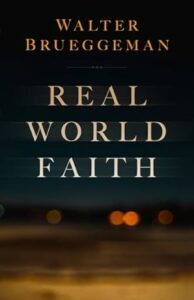 Real World Faith Walter Brueggemann (Fortress Press) $24.95 OUR SALE PRICE = $19.96
Real World Faith Walter Brueggemann (Fortress Press) $24.95 OUR SALE PRICE = $19.96
Many a year we have named a Brueggemann book in our annual summary of our favorite reads. There have been a number of Biblical study books released by (and about) Brueggey this year — not to mention his two splendid, little books of prayers (Acting in the Wake: Prayers for Justice and Following Into Risky Obedience: Prayers Along the Journey) so I was stumped to pick a favorite for 2023. Re-visiting them and was struck again and again by the pieces in this collection. Although it may seem a bit incongruous, Brueggemann has been blogging, and Real World Faith is the first collection of some of his greatest hits on social media these past years.
And what a book it is. It includes lots of short sermons, Biblical studies, cultural explorations, words of rage about the dysfunctions of the economy and expressing horror at the attack upon our very American fabric.
There are three major groupings of pieces here, the first part on the nature of the church and its mission; naturally this is, in his view, deeply related to our work for our neighbor and seeking the shalom of the city in which we live. The second unit is entitled “Social Pain and Possibility!” (Note that rare exclamation point.) He moves on to another half a dozen essays about “civic membership, responsibility, and failure.” The next unit are reflections on war and peace. He does some Biblical work in all of these (how can he not) and examines our typical views with how he might think God thinks about all of this.
The final handful of pieces are more occasional, about personal stuff — his cat (and Buber!) — and these are quite beautiful; even in a splendid essay about baseball and sports writing he insinuates much about a good and beautiful Christian understanding. The last piece “Undeserving in Michigan” is nearly worth the price of the book. His view of a Biblically liberating faith simply is not constrained by the ethos of the empire and this book offers the implications of his prophetic imagination as nicely as any.
By the way, one of the first new books of 2024 is the brand new collection of short Brueggemann blog pieces. It’s remarkable, called The Emancipation of God: Postmarks on Cultural Prophecy, edited by Conrad Kanagy (Fortress; $28.00 – OUR SALE PRICE = $22.40.) Just saying…
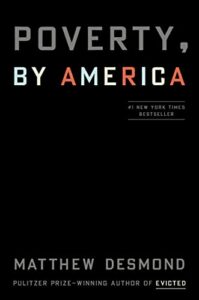 Poverty By America Matthew Desmond (Crown) $28.00 OUR SALE PRICE = $22.40
Poverty By America Matthew Desmond (Crown) $28.00 OUR SALE PRICE = $22.40
Who among BookNotes readers hasn’t at least heard of Desmond’s masterpiece from several years ago, Evicted, which won the Pulitzer Prize for nonfiction, a National Crisis Circle Award, a Carnegie Medal and more. Its study of homelessness in Minneapolis offering riveting reporting and astute analysis. What a book that was.
This is the long awaited follow-up where Mr. Desmond (a sociology professor at Princeton University) turns his study to the broader question of poverty in America. That he calls the book “by America” is more than an allusive bit of wordsmithing, although he is a good writer. He is making an argument here about systems and structures and policies and the causes of poverty. Like the Bible (see above) he knows that the problem of poor folks isn’t merely that they don’t work hard enough and that often public policy can deepen economic anxiety among the most vulnerable.
This serious book asks what kind of problem poverty is and documents the meaning of it all as well as nearly anything I’ve read lately. There are shades of the concerns of some of our most urgent writers on these themes — from Jonathan Kozol and Ron Sider and the prophet Amos — but he draws most on his academic work and the sociological thinkers who have done the research on the underclass and the working poor and those who have crunched the data. He obviously draws on William Julias Wilson and cites Richard Rothstein and even The Rev. William Barber but mostly the footnotes reveal a hefty plethora of scholars and researchers. And then, yes, almost surprisingly in this data heavy text, there is a beautiful citation from Walter Brueggemann. Like I said, what a book!
A VERY SPECIAL AWARD FOR VERY FAVORITE POETRY VOLUME
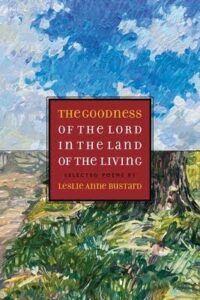 The Goodness of the Lord in the Land of the Living: Selected Poems by Leslie Anne Bustard Leslie Bustard (Square Halo Books) $12.99 OUR SALE PRICE = $10.39
The Goodness of the Lord in the Land of the Living: Selected Poems by Leslie Anne Bustard Leslie Bustard (Square Halo Books) $12.99 OUR SALE PRICE = $10.39
It isn’t every day that a small town bookseller has a customer and friend who ends up slowly realizing she is a poet and slowly getting published here and there, writing in classy online magazines and ending up on podcasts and doing readings, eventually gaining acclaim from serious artists and world renowned poets (like Malcolm Guite.) Such were the later years of our friend Leslie Bustard and I am fighting back tears as I type, recalling that when I first highlighted this book last winter she was still walking on the Earth. She is alive, now, more than ever (“awakened on Mercy’s shores”) but is gone from us. I am glad that Square Halo Books published this expertly curated collection of some of her best work. Had she not died, I am sure I would be celebrating this book here, anyway. Now I simply must pay tribute. Many writerly folks have endorsed this book, complimenting her good, creative work (and there are several different sorts of poems here, too, making it a real delight.) The 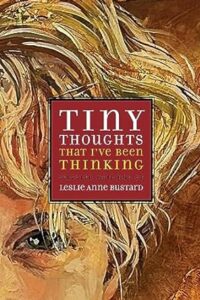 wonderful Hannah Anderson did the preface. Kudos.
wonderful Hannah Anderson did the preface. Kudos.
(The above mentioned little 2023 poetry volume will be enhanced and expanded and re-released as a fuller collection of her work, releasing, we hear, in late February, 2024. It has been edited by Thea Rosenburg, will be soon published by Square Halo Books, and is to be called Tiny Thoughts That I’ve Been Thinking: Selected Writings of Leslie Anne Bustard. $24.99 OUR SALE PRICE = $19.99. We, of course, are taking pre-orders now. It will be on our list of Best Books of 2024, I promise.)
+++
TO PLACE AN ORDER
PLEASE READ, THEN SCROLL DOWN AND CLICK ON THE “ORDER HERE” LINK BELOW.
It is helpful if you tell us how you want us to ship your orders.And if you are doing a pre-order, tell us if you want us to hold other books until the pre-order comes, or send some now, and others later… we’re eager to serve you in a way that you prefer. Let us know your hopes.
The weight and destination of your package varies but you can use this as a quick, general guide:
There are generally two kinds of US Mail options and, of course, UPS. If necessary, we can do overnight and other expedited methods, too. Just ask.
- United States Postal Service has the option called “Media Mail” which is cheapest but can be a little slower. For one typical book, usually, it’s $4.12; 2 lbs would be $4.87. This is the cheapest method available and seems not to be too delayed.
- United States Postal Service has another, quicker option called “Priority Mail” which is $8.50, if it fits in a flat-rate envelope. Many children’s books and some Bibles are oversized so that might take the next size up which is $9.20. “Priority Mail” gets much more attention than does “Media Mail” and is often just a few days to anywhere in the US.
- UPS Ground is reliable but varies by weight and distance and may take longer than USPS. Sometimes they are cheaper than Priority. We’re happy to figure out your options for you once we know what you want.
If you just want to say “cheapest” that is fine. If you are eager and don’t want the slowest method, do say so. It really helps us serve you well so let us know. Keep in mind the possibility of holiday supply chain issues and slower delivery… still, we’re excited to serve you.
BookNotes

SPECIAL
DISCOUNT
20% OFF
ALL BOOKS MENTIONED
this takes you to the secure Hearts & Minds order form page
just tell us what you want to order
if you have questions or need more information
just ask us what you want to know
Hearts & Minds 234 East Main Street Dallastown PA 17313
read@heartsandmindsbooks.com
717-246-3333
Sadly, as of January 2024 we are still closed for in-store browsing. COVID is not fully over and is truly on the rise. Since few are reporting their illnesses anymore, it is tricky to know the reality but the best measurement is to check the waste water tables to see the amount of virus in the eco-system. It is now getting worse. It is still important to be aware of how risks we take might effect the public good — those at risk, while not dying from the virus, are experiencing long-term health consequences. (Just check the latest reports of the rise of heart attacks and diabetes among younger adults, caused by long Covid.) It is complicated, but we are still closed for in-store browsing due to our commitment to public health (and the safety of our family who live here, our staff, and customers.) Our store is a bit cramped without top-notch ventilation, so we are trying to be wise. Thanks for understanding.
We will keep you posted about our future plans… we are eager to reopen. Pray for us.
We are doing our curb-side and back yard customer service and can show any number of items to you if you call us from our back parking lot. It’s sort of fun, actually. We are eager to serve and grateful for your patience as we all work to mitigate the pandemic. We are very happy to help, so if you are in the area, do stop by. We love to see friends and customers.
We are happy to ship books anywhere.
We are here 10:00 – 6:00 EST / Monday – Saturday. Closed on Sunday.
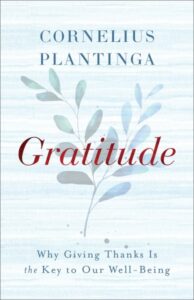 Gratitude: Why Giving Thanks Is the Key to Our Well-Being Cornelius Plantinga (Brazos Press) $22.99 OUR SALE PRICE = $18.39
Gratitude: Why Giving Thanks Is the Key to Our Well-Being Cornelius Plantinga (Brazos Press) $22.99 OUR SALE PRICE = $18.39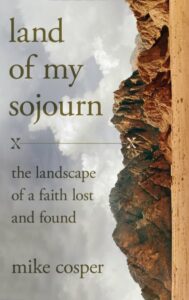 Land of My Sojourn: The Landscape of a Faith Lost and Found Mike Cosper (IVP) $24.00 OUR SALE PRICE = $19.20
Land of My Sojourn: The Landscape of a Faith Lost and Found Mike Cosper (IVP) $24.00 OUR SALE PRICE = $19.20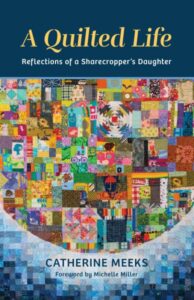 A Quilted Life: Reflections of a Sharecropper’s Daughter Catherine Meeks (Eerdmans) $26.99 OUR SALE PRICE = $21.59
A Quilted Life: Reflections of a Sharecropper’s Daughter Catherine Meeks (Eerdmans) $26.99 OUR SALE PRICE = $21.59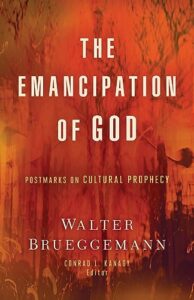 The Emancipation of God: Postmarks on Cultural Prophecy Walter Brueggemann (Fortress) $28.00 OUR SALE PRICE = $22.40
The Emancipation of God: Postmarks on Cultural Prophecy Walter Brueggemann (Fortress) $28.00 OUR SALE PRICE = $22.40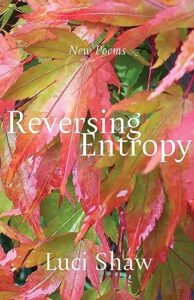 Reversing Entropy: Poems Luci Shaw (Paraclete) $22.00 OUR SALE PRICE = $17.60
Reversing Entropy: Poems Luci Shaw (Paraclete) $22.00 OUR SALE PRICE = $17.60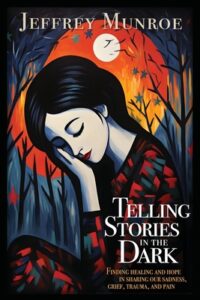 Telling Stories in the Dark: Finding Healing and Hope in Sharing Our Sadness, Grief, Trauma, and Pain Jeffrey Monroe (Reformed Journal Books) $21.99 OUR SALE PRICE = $17.59
Telling Stories in the Dark: Finding Healing and Hope in Sharing Our Sadness, Grief, Trauma, and Pain Jeffrey Monroe (Reformed Journal Books) $21.99 OUR SALE PRICE = $17.59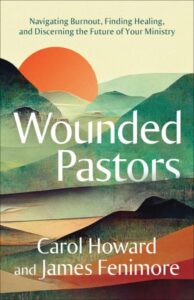 Wounded Pastors: Navigating Burnout, Finding Healing, and Discerning the Future of Your Ministry Carol Howard and James Fenimore (WJK) $25.00 OUR SALE PRICE = $20.00
Wounded Pastors: Navigating Burnout, Finding Healing, and Discerning the Future of Your Ministry Carol Howard and James Fenimore (WJK) $25.00 OUR SALE PRICE = $20.00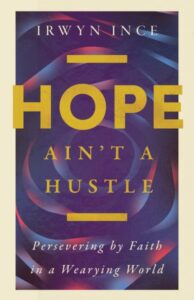 Hope Ain’t a Hustle: Persevering by Faith in a Wearying World Irwyn L. Ince (IVP) $18.00 OUR SALE PRICE = $14.40
Hope Ain’t a Hustle: Persevering by Faith in a Wearying World Irwyn L. Ince (IVP) $18.00 OUR SALE PRICE = $14.40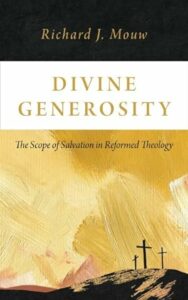 Divine Generosity: The Scope of Salvation in Reformed Theology Richard J. Mouw (Eerdmans) $19.99 OUR SALE PRICE = $15.20
Divine Generosity: The Scope of Salvation in Reformed Theology Richard J. Mouw (Eerdmans) $19.99 OUR SALE PRICE = $15.20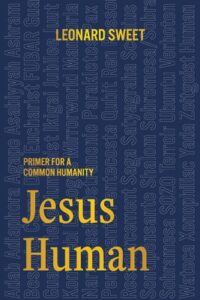 Jesus Human: A Primer for a Common Humanity Leonard Sweet (The Salish Sea Press) $27.95 OUR SALE PRICE = $22.36
Jesus Human: A Primer for a Common Humanity Leonard Sweet (The Salish Sea Press) $27.95 OUR SALE PRICE = $22.36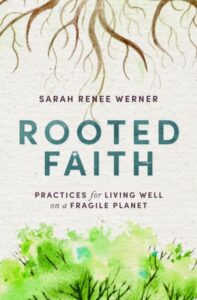 Rooted Faith: Practices for Living Well on a Fragile Planet Sarah Renee Werner (Herald Press) $18.99 OUR SALE PRICE = $15.19
Rooted Faith: Practices for Living Well on a Fragile Planet Sarah Renee Werner (Herald Press) $18.99 OUR SALE PRICE = $15.19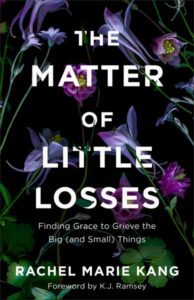 The Matter of Little Losses: Finding Grace to Grieve the Big (and Small) Things Rachel Marie Kang (Revell) $17.99 OUR SALE PRICE = $14.39
The Matter of Little Losses: Finding Grace to Grieve the Big (and Small) Things Rachel Marie Kang (Revell) $17.99 OUR SALE PRICE = $14.39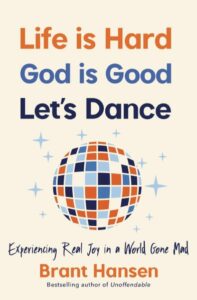 Life Is Hard, God Is Good, Let’s Dance: Experiencing Real Joy in a World Gone Mad Brant Hansen (Thomas Nelson) $18.99 OUR SALE PRICE = $15.19
Life Is Hard, God Is Good, Let’s Dance: Experiencing Real Joy in a World Gone Mad Brant Hansen (Thomas Nelson) $18.99 OUR SALE PRICE = $15.19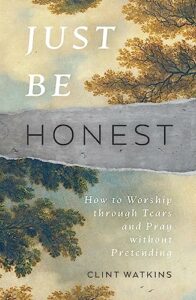 Just Be Honest: How to Worship through Tears and Pray without Pretending Clinton Watkins (The Good Book Company) $14.99 OUR SALE PRICE = $11.99
Just Be Honest: How to Worship through Tears and Pray without Pretending Clinton Watkins (The Good Book Company) $14.99 OUR SALE PRICE = $11.99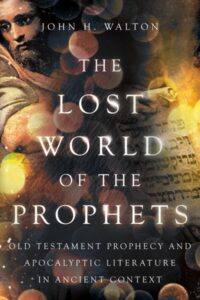 The Lost World of the Prophets: Old Testament Prophecy and Apocalyptic Literature in Ancient Context John Walton (IVP Academic) $22.00 OUR SALE PRICE = $17.60
The Lost World of the Prophets: Old Testament Prophecy and Apocalyptic Literature in Ancient Context John Walton (IVP Academic) $22.00 OUR SALE PRICE = $17.60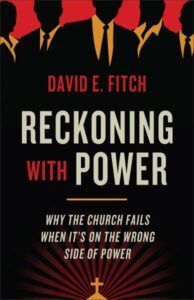 Reckoning with Power: Why The Church Fails When It’s on the Wrong Side of Power David E Fitch (Brazos Press) $19.99 OUR SALE PRICE = $15.20
Reckoning with Power: Why The Church Fails When It’s on the Wrong Side of Power David E Fitch (Brazos Press) $19.99 OUR SALE PRICE = $15.20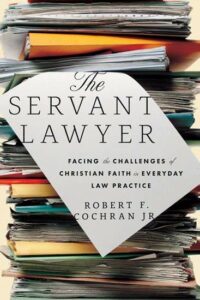 The Servant Lawyer: Facing the Challenges of Christian Faith in Everyday Law Practice Robert Cochran (IVP) $28.00 OUR SALE PRICE = $22.40
The Servant Lawyer: Facing the Challenges of Christian Faith in Everyday Law Practice Robert Cochran (IVP) $28.00 OUR SALE PRICE = $22.40 Living Undivided: Loving Courageously for Racial Healing and Justice Chuck Mango and Troy Jackson (Baker Books) $24.99 OUR SALE PRICE = $19.99
Living Undivided: Loving Courageously for Racial Healing and Justice Chuck Mango and Troy Jackson (Baker Books) $24.99 OUR SALE PRICE = $19.99 Saint Valentine the Kindhearted Ned Bustard (IVP Kids) $18.00 OUR SALE PRICE = $14.40
Saint Valentine the Kindhearted Ned Bustard (IVP Kids) $18.00 OUR SALE PRICE = $14.40

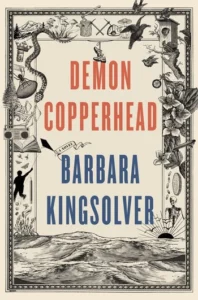 Demon Copperhead Barbara Kingsolver (Harper) $32.50
Demon Copperhead Barbara Kingsolver (Harper) $32.50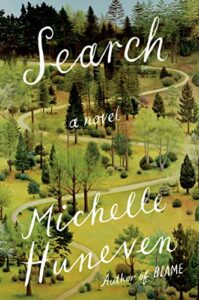 Search: A Novel Michelle Huneven Penguin $18.00
Search: A Novel Michelle Huneven Penguin $18.00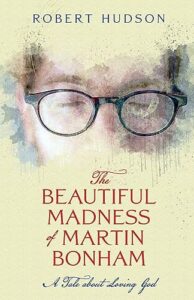 The Beautiful Madness of Martin Bonham: A Tale About Loving God Robert Hudson (The Apocryphal Press) $24.99
The Beautiful Madness of Martin Bonham: A Tale About Loving God Robert Hudson (The Apocryphal Press) $24.99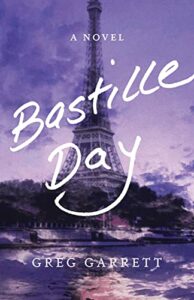 Bastille Day: A Novel Greg Garrett (Raven /Paraclete) $19.99
Bastille Day: A Novel Greg Garrett (Raven /Paraclete) $19.99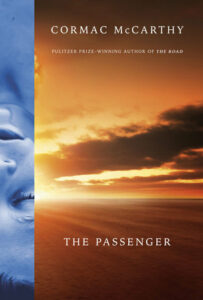 The Passenger Cormac McCarthy (Vintage) $18.00
The Passenger Cormac McCarthy (Vintage) $18.00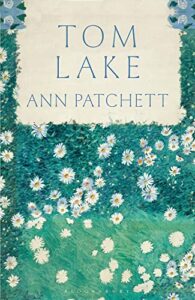 Tom Lake
Tom Lake Out of Esau: A Novel Michelle Webster Hein (Counterpoint) $27.00
Out of Esau: A Novel Michelle Webster Hein (Counterpoint) $27.00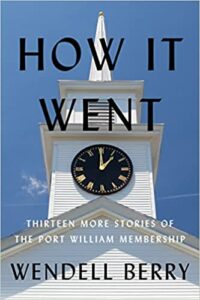 How It Went: Thirteen More Stories of the Port William Membership Wendell Berry (Counterpoint) $16.95
How It Went: Thirteen More Stories of the Port William Membership Wendell Berry (Counterpoint) $16.95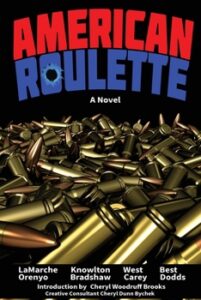 American Roulette: A Novel Matthew Best, J.M. West, and others
American Roulette: A Novel Matthew Best, J.M. West, and others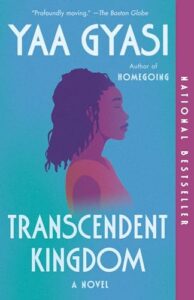 Transcendent Kingdom: A Novel Yaa Gyasi (Vintage) $16.00
Transcendent Kingdom: A Novel Yaa Gyasi (Vintage) $16.00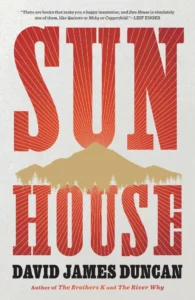 Sun House David James Duncan (Little Brown) $35.00
Sun House David James Duncan (Little Brown) $35.00 Where’d You Park Your Spaceship? An Interplanetary Tale of Love, Loss, and Bread Book One: Welcome to Firdus Rob Bell (Backhouse Books) $23.00
Where’d You Park Your Spaceship? An Interplanetary Tale of Love, Loss, and Bread Book One: Welcome to Firdus Rob Bell (Backhouse Books) $23.00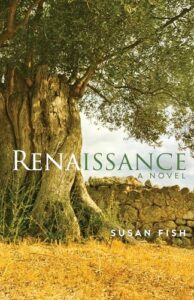 Renaissance: A Novel Susan Fish (Raven) $20.00
Renaissance: A Novel Susan Fish (Raven) $20.00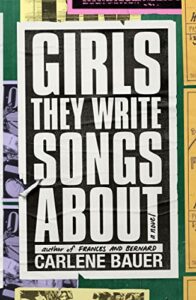 Girls They Write Songs About: A Novel Carlene Bauer (Picador) $19.00
Girls They Write Songs About: A Novel Carlene Bauer (Picador) $19.00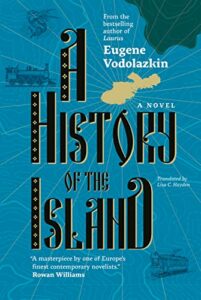
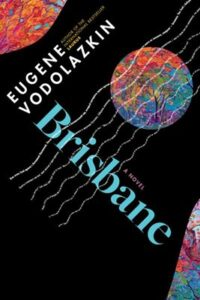 Brisbane and A History of the Island Eugene Vodolazkin (Plough) $26.95 each
Brisbane and A History of the Island Eugene Vodolazkin (Plough) $26.95 each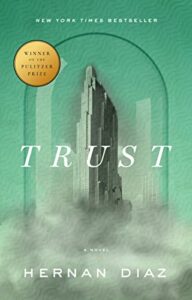 Trust: A Novel Hernan Diaz (Riverhead) $17.00
Trust: A Novel Hernan Diaz (Riverhead) $17.00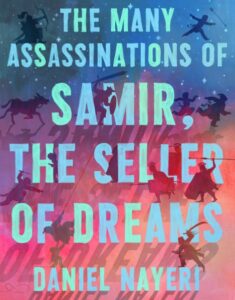 The Many Assassinations of Samir, the Seller of Dreams Daniel Nayeri (Levine Querido) $21.99 OUR SALE PRIUCE = $17.59
The Many Assassinations of Samir, the Seller of Dreams Daniel Nayeri (Levine Querido) $21.99 OUR SALE PRIUCE = $17.59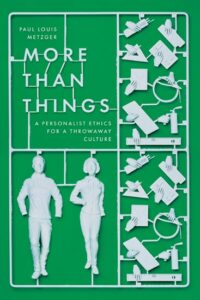 More Than Things: A Personalist Ethics for a Throwaway Culture Paul Louis Metzger (IVP Academic) $48.00
More Than Things: A Personalist Ethics for a Throwaway Culture Paul Louis Metzger (IVP Academic) $48.00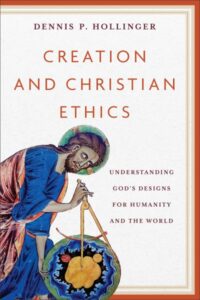 Creation and Christian Ethics: Understanding God’s Designs for Humanity and the World Dennis P.
Creation and Christian Ethics: Understanding God’s Designs for Humanity and the World Dennis P.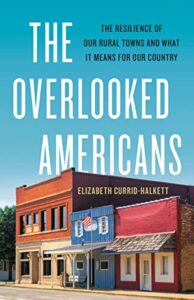 The Overlooked Americans: The Resilience of Our Rural Towns and What It Means for Our Country Elizabeth Currid-Halkett (Basic Books) $32.00
The Overlooked Americans: The Resilience of Our Rural Towns and What It Means for Our Country Elizabeth Currid-Halkett (Basic Books) $32.00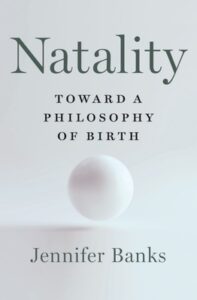 Natality: Toward a Philosophy of Birth Jennifer Banks (Norton) $27.95
Natality: Toward a Philosophy of Birth Jennifer Banks (Norton) $27.95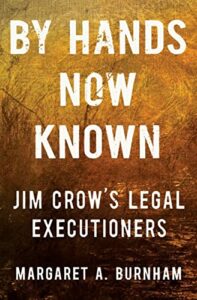 By Hands Now Known: Jim Crow’s Legal Executioners Margaret A. Burnham (Norton) $30.00
By Hands Now Known: Jim Crow’s Legal Executioners Margaret A. Burnham (Norton) $30.00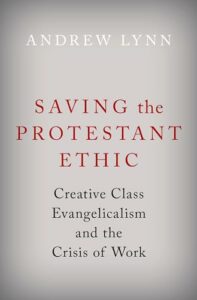 Saving the Protestant Ethic: Creative Class Evangelicalism and the Crisis of Work Andrew Lynn (Oxford University Press) $35.00
Saving the Protestant Ethic: Creative Class Evangelicalism and the Crisis of Work Andrew Lynn (Oxford University Press) $35.00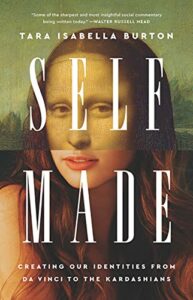 Self Made: Creating Our Identities From Da Vinci to the Kardashians Tara Isabella Burton (Public Affairs) $30.00
Self Made: Creating Our Identities From Da Vinci to the Kardashians Tara Isabella Burton (Public Affairs) $30.00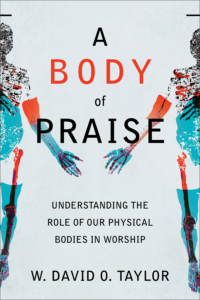 A Body of Praise: Understanding the Role of Our Physical Bodies in Worship W. David O. Taylor (Baker Academic) $26.99 OUR SALE PRICE = $21.59
A Body of Praise: Understanding the Role of Our Physical Bodies in Worship W. David O. Taylor (Baker Academic) $26.99 OUR SALE PRICE = $21.59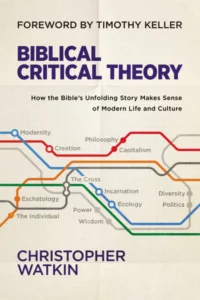 Biblical Critical Theory: How the Bible’s Unfolding Story Makes Sense of Modern Life and Culture Christopher Watkin (Zondervan Academic) $49.99
Biblical Critical Theory: How the Bible’s Unfolding Story Makes Sense of Modern Life and Culture Christopher Watkin (Zondervan Academic) $49.99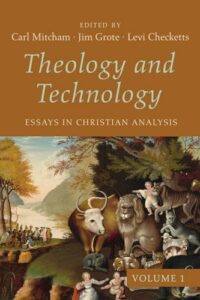 Theology and Technology: Essays in Christian Analysis edited by Carl Mitcham, Jim Grove, Levi Checketts (Wipf & Stock) $26.00
Theology and Technology: Essays in Christian Analysis edited by Carl Mitcham, Jim Grove, Levi Checketts (Wipf & Stock) $26.00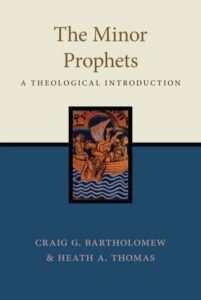 The Minor Prophets: A Theological Introduction Craig Bartholomew & Heath A. Thomas (IVP Academic) $45.00
The Minor Prophets: A Theological Introduction Craig Bartholomew & Heath A. Thomas (IVP Academic) $45.00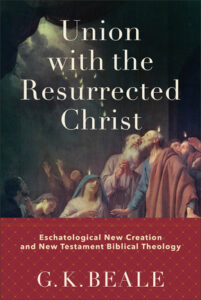 Union with the Resurrected Christ: Eschatological New Creation and New Testament Biblical Theology G.K. Beale (Baker Academic) $49.99
Union with the Resurrected Christ: Eschatological New Creation and New Testament Biblical Theology G.K. Beale (Baker Academic) $49.99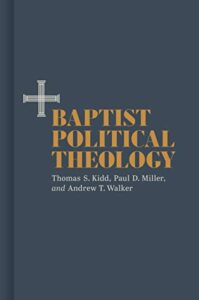 Baptist Political Theology edited by Thomas Kidd, Paul D. Miller & Andrew Walker (B+H Academic) $59.99
Baptist Political Theology edited by Thomas Kidd, Paul D. Miller & Andrew Walker (B+H Academic) $59.99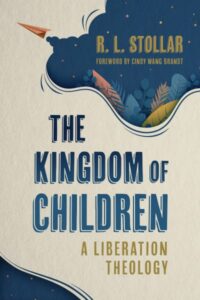 The Kingdom of Children: A Liberation Theology R.L. Stollar (Eerdmans) $24.99
The Kingdom of Children: A Liberation Theology R.L. Stollar (Eerdmans) $24.99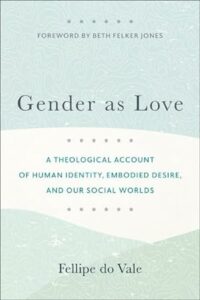 Gender as Love: A Theological Account of Human Identity, Embodied Desire, and Our Social Worlds Fillipe do Vale (Baker Academic) $34.99
Gender as Love: A Theological Account of Human Identity, Embodied Desire, and Our Social Worlds Fillipe do Vale (Baker Academic) $34.99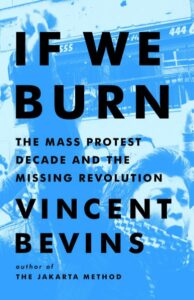 If We Burn: The Mass Protest Decade and the Missing Revolution Vincent Bevins (Public Affairs) $30.00
If We Burn: The Mass Protest Decade and the Missing Revolution Vincent Bevins (Public Affairs) $30.00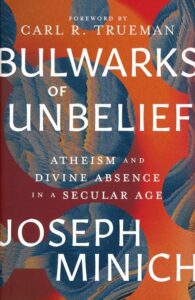 Bulwarks of Unbelief: Atheism and Divine Absence in a Secular Age Jospeh Minich (Lexham Academic) $32.99
Bulwarks of Unbelief: Atheism and Divine Absence in a Secular Age Jospeh Minich (Lexham Academic) $32.99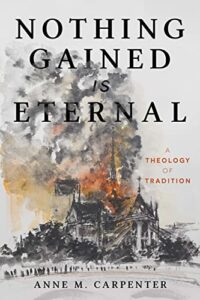 Nothing Gained is Eternal: A Theology of Tradition Anne M. Carpenter (Fortress) $34.00
Nothing Gained is Eternal: A Theology of Tradition Anne M. Carpenter (Fortress) $34.00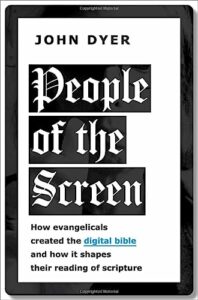 People of the Screen: How Evangelicals Created the Digital Bible and How It Shapes Their Reading of Scripture John Dyer (Oxford University Press) $29.95
People of the Screen: How Evangelicals Created the Digital Bible and How It Shapes Their Reading of Scripture John Dyer (Oxford University Press) $29.95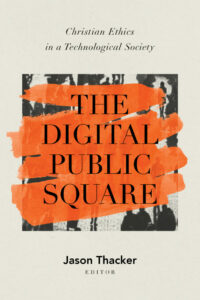 The Digital Public Square: Christian Ethics in a Technological Society edited by Jason Thacker (B&H Academic) $34.99
The Digital Public Square: Christian Ethics in a Technological Society edited by Jason Thacker (B&H Academic) $34.99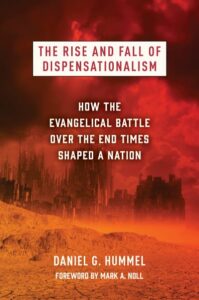 The Rise and Fall of Dispensationalism: How the Evangelical Battle Over the End Times Shaped a Nation Daneil G. Hummel (Eerdmans) $29.99
The Rise and Fall of Dispensationalism: How the Evangelical Battle Over the End Times Shaped a Nation Daneil G. Hummel (Eerdmans) $29.99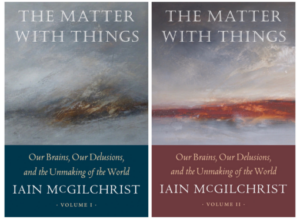 The Matter With Things: Our Brains, Our Delusions, and the Unmaking of the World Volumes I and II Iain McGilchrist (Perspective Press) $95.99 – no discount on this item
The Matter With Things: Our Brains, Our Delusions, and the Unmaking of the World Volumes I and II Iain McGilchrist (Perspective Press) $95.99 – no discount on this item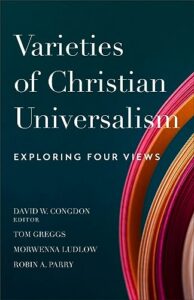 Varieties of Christian Universalism: Exploring Four Views edited by David Condon (Baker Academic) $24.99
Varieties of Christian Universalism: Exploring Four Views edited by David Condon (Baker Academic) $24.99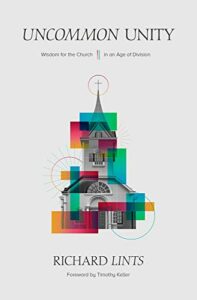 Uncommon Unity: Wisdom for the Church in an Age of Division Richard Lints (Lexham Press) $29.99
Uncommon Unity: Wisdom for the Church in an Age of Division Richard Lints (Lexham Press) $29.99 Reading for the Love of God: How to Read as a Spiritual Practice Jessica Hooten Wilson (Brazos Press) $24.99
Reading for the Love of God: How to Read as a Spiritual Practice Jessica Hooten Wilson (Brazos Press) $24.99 Nourishing Narratives: The Power of Story to Shape Our Faith Jennifer L. Holberg (IVP Academic) $25.00
Nourishing Narratives: The Power of Story to Shape Our Faith Jennifer L. Holberg (IVP Academic) $25.00 We Become What We Normalize: What We Owe Each Other in Worlds That Demand Our Silence David Dark (Broadleaf Books) $26.99
We Become What We Normalize: What We Owe Each Other in Worlds That Demand Our Silence David Dark (Broadleaf Books) $26.99 Working from the Inside Out: A Brief Guide to Inner Work That Transforms Our Outer World Jeff Haanen (IVP) $18.00
Working from the Inside Out: A Brief Guide to Inner Work That Transforms Our Outer World Jeff Haanen (IVP) $18.00 Women, Work, and Calling: Step Into Your Place in God’s World Joanna Meyer (IVP) $15.00
Women, Work, and Calling: Step Into Your Place in God’s World Joanna Meyer (IVP) $15.00 Faithful Work: In the Daily Grind with God and for Others Ross Chapman & Ryan Tafilowski (IVP) $15.00
Faithful Work: In the Daily Grind with God and for Others Ross Chapman & Ryan Tafilowski (IVP) $15.00


 Sacred Seasons: A Family Guide to Center Your Year Around Jesus
Sacred Seasons: A Family Guide to Center Your Year Around Jesus How To Be Married (To Melissa) – A Hilarious Guide to a Happier, One-of-a-Kind Marriage Dustin Nickerson (Nelson Books) $19.99
How To Be Married (To Melissa) – A Hilarious Guide to a Happier, One-of-a-Kind Marriage Dustin Nickerson (Nelson Books) $19.99 Remaking the World: How 1776 Created the Post-Christian West Andrew Wilson (Crossway) $29.99
Remaking the World: How 1776 Created the Post-Christian West Andrew Wilson (Crossway) $29.99 Opinions: A Decade of Arguments, Criticisms, and Minding Other People’s Business Roxane Gay (Harper) $30.00
Opinions: A Decade of Arguments, Criticisms, and Minding Other People’s Business Roxane Gay (Harper) $30.00 All My Knotted-Up Life: A Memoir Beth Moore (Tyndale) $27.99
All My Knotted-Up Life: A Memoir Beth Moore (Tyndale) $27.99 How Far to the Promised Land: One Black Family’s Story of Hope and Survival in the American South Esau McCaulley (Convergent Books) $27.00
How Far to the Promised Land: One Black Family’s Story of Hope and Survival in the American South Esau McCaulley (Convergent Books) $27.00 How to Stay Married: The Most Insane Love Story Ever Told Harrison Scott Key (Avid Reader Press) $27.99
How to Stay Married: The Most Insane Love Story Ever Told Harrison Scott Key (Avid Reader Press) $27.99 Where the Waves Turn Back: A Forty-Day Pilgrimage Along the California Coast
Where the Waves Turn Back: A Forty-Day Pilgrimage Along the California Coast Meet Me Tonight in Atlantic City: A Memoir Jane Wong (Tin House Books) $27.95
Meet Me Tonight in Atlantic City: A Memoir Jane Wong (Tin House Books) $27.95 Leaping from the Burning Train: A Poet’s Journey of Faith Jeanne Murray Walker (Slant Books) $20.00
Leaping from the Burning Train: A Poet’s Journey of Faith Jeanne Murray Walker (Slant Books) $20.00 The Women They Wanted: Shattering the Illusion of the Good Christian Wife Shannon Harris (Broadleaf Books) $27.99
The Women They Wanted: Shattering the Illusion of the Good Christian Wife Shannon Harris (Broadleaf Books) $27.99 A Living Remedy: A Memoir Nicole Chung (Ecco) $29.99
A Living Remedy: A Memoir Nicole Chung (Ecco) $29.99 Shattered: A Son Picks Up the Pieces of His Father’s Rage Arthur Boers (Eerdmans) $22.99
Shattered: A Son Picks Up the Pieces of His Father’s Rage Arthur Boers (Eerdmans) $22.99 The Best Strangers in the World: Stories from a Life Spent Listening Ari Shapiro (HarperOne) $28.99
The Best Strangers in the World: Stories from a Life Spent Listening Ari Shapiro (HarperOne) $28.99 Lessons for Healing in a World That Is Sick Lyndsey Medford (Broadleaf Books) $25.99
Lessons for Healing in a World That Is Sick Lyndsey Medford (Broadleaf Books) $25.99 King: A Life Jonathan Eig (Farrar Straus Giroux) $35.00
King: A Life Jonathan Eig (Farrar Straus Giroux) $35.00 Walter Brueggemann’s Prophetic Imagination: A Theological Biography Conrad L. Kanagy (Fortress) $24.95
Walter Brueggemann’s Prophetic Imagination: A Theological Biography Conrad L. Kanagy (Fortress) $24.95 Tolkien’s Faith: A Spiritual Biography Holly Ordway (Word on Fire Academic) $34.95
Tolkien’s Faith: A Spiritual Biography Holly Ordway (Word on Fire Academic) $34.95 Timothy Keller: His Spiritual and Intellectual Formation Colin Hansen (Zondervan Academic) $26.99
Timothy Keller: His Spiritual and Intellectual Formation Colin Hansen (Zondervan Academic) $26.99 Why We Create edited by Brian Brown & Jane Clark Scharl (Square Halo Books) $16.99
Why We Create edited by Brian Brown & Jane Clark Scharl (Square Halo Books) $16.99 The Cult of Creativity: A Surprisingly Recent History Samuel W. Franklin (Chicago University Press) $26.00
The Cult of Creativity: A Surprisingly Recent History Samuel W. Franklin (Chicago University Press) $26.00 The Church in an Age of Secular Mysticism: Why Spirituality without God Fail to Transform Us Andrew Root (Baker Academic) $28.99
The Church in an Age of Secular Mysticism: Why Spirituality without God Fail to Transform Us Andrew Root (Baker Academic) $28.99 : A Future for Your Congregation Beyond More Money, Programs, and Innovation Andrew Root & Blair D. Bertrand (Brazos Press) $21.99
: A Future for Your Congregation Beyond More Money, Programs, and Innovation Andrew Root & Blair D. Bertrand (Brazos Press) $21.99 Pivot: The Priorities, Practices, and Powers That Can Transform Your Church Into a Tov Culture Scot McKnight & Laura Barring (Tyndale) $22.99
Pivot: The Priorities, Practices, and Powers That Can Transform Your Church Into a Tov Culture Scot McKnight & Laura Barring (Tyndale) $22.99 Earth Filled with Heaven: Finding Life in Liturgy, Sacraments, and Other Ancient Practices of the Church Aaron Damiani (Moody Press) $14.99
Earth Filled with Heaven: Finding Life in Liturgy, Sacraments, and Other Ancient Practices of the Church Aaron Damiani (Moody Press) $14.99 The Weary Leader’s Guide to Burnout Sean Nemecek (Zondervan) $19.99
The Weary Leader’s Guide to Burnout Sean Nemecek (Zondervan) $19.99 How to Know a Person: The Art of Seeing Others Deeply and Being Deeply Seen David Brooks (Random House) $30.00
How to Know a Person: The Art of Seeing Others Deeply and Being Deeply Seen David Brooks (Random House) $30.00 The Deepest Place: Suffering and the Formation of Hope Curt Thompson (Zondervan) $27.99
The Deepest Place: Suffering and the Formation of Hope Curt Thompson (Zondervan) $27.99 Holy Unhappiness: God, Goodness, and the Myth of the Blessed Life Amanda Held Opelt (Worthy) $27.00
Holy Unhappiness: God, Goodness, and the Myth of the Blessed Life Amanda Held Opelt (Worthy) $27.00 A Quiet Mind to Suffer With: Mental Illness, Trauma, and the Death of Christ John Andrew Bryant (Lexham Press) $19.99
A Quiet Mind to Suffer With: Mental Illness, Trauma, and the Death of Christ John Andrew Bryant (Lexham Press) $19.99 Bridge and Tunnel Boys: Bruce Springsteen, Billy Joel, and the Metropolitan Sound of the American Century Jim Cullen (Rutgers University Press) $31.95
Bridge and Tunnel Boys: Bruce Springsteen, Billy Joel, and the Metropolitan Sound of the American Century Jim Cullen (Rutgers University Press) $31.95 Learning to Love: Christian Higher Education as Pilgrimage Alex Sosler (Falls City Press) $18.99
Learning to Love: Christian Higher Education as Pilgrimage Alex Sosler (Falls City Press) $18.99 The Liberating Arts: Why We Need Liberal Arts Education edited by Jeffrey Bilbo, Jessica Hooten Wilson & David Henreckson (Plough Publishing House) $19.95
The Liberating Arts: Why We Need Liberal Arts Education edited by Jeffrey Bilbo, Jessica Hooten Wilson & David Henreckson (Plough Publishing House) $19.95 Centering Jesus: How the Lamb of God Transforms Our Communities, Ethics, & Spiritual Lives Derek Vreeland (NavPress) $17.99
Centering Jesus: How the Lamb of God Transforms Our Communities, Ethics, & Spiritual Lives Derek Vreeland (NavPress) $17.99 Ordinary Saints: Living Everyday Life to the Glory of God edited by Ned Bustard (Square Halo Books) $24.99
Ordinary Saints: Living Everyday Life to the Glory of God edited by Ned Bustard (Square Halo Books) $24.99 Sacred Strides: The Journey to Belovedness in Work and Rest Justin McRoberts (W Publishing Group) $18.99 OUR SALE PRICE = $15.19
Sacred Strides: The Journey to Belovedness in Work and Rest Justin McRoberts (W Publishing Group) $18.99 OUR SALE PRICE = $15.19 The Right: The Hundred Year War for American Conservatives Matthew Continetti (Basic Books) $19.99
The Right: The Hundred Year War for American Conservatives Matthew Continetti (Basic Books) $19.99 The Kingdom, The Power, and the Glory: American Evangelicals in an Age of Extremism Tim Alberta (Harper) $35.00
The Kingdom, The Power, and the Glory: American Evangelicals in an Age of Extremism Tim Alberta (Harper) $35.00 Taken By Surprise: The Asbury Revival of 2023 Mark R. Elliott (Seedbed) $18.95
Taken By Surprise: The Asbury Revival of 2023 Mark R. Elliott (Seedbed) $18.95 Singing the Psalms with My Son: Praying and Parenting for a Healed Planet T. Wilson Dickinson (Cascade) $23.00
Singing the Psalms with My Son: Praying and Parenting for a Healed Planet T. Wilson Dickinson (Cascade) $23.00 In Thought, Word, and Seed: Reckonings from a Midwest Farm Tiffany Eberle Kriner (Eerdmans) $19.99
In Thought, Word, and Seed: Reckonings from a Midwest Farm Tiffany Eberle Kriner (Eerdmans) $19.99 Lost & Found: Reflections on Grief, Gratitude, and Happiness Kathryn Schulz (Random House) $19.00
Lost & Found: Reflections on Grief, Gratitude, and Happiness Kathryn Schulz (Random House) $19.00 Zero at the Bone: Fifty Entries Against Despair Christian Wiman (Farrar, Straus & Giroux) $30.00
Zero at the Bone: Fifty Entries Against Despair Christian Wiman (Farrar, Straus & Giroux) $30.00 Just Discipleship: Biblical Justice in an Unjust World Michael J. Rhodes (IVP Academic) $32.00
Just Discipleship: Biblical Justice in an Unjust World Michael J. Rhodes (IVP Academic) $32.00 Real World Faith Walter Brueggemann (Fortress Press) $24.95
Real World Faith Walter Brueggemann (Fortress Press) $24.95 Poverty By America Matthew Desmond (Crown) $28.00
Poverty By America Matthew Desmond (Crown) $28.00 The Goodness of the Lord in the Land of the Living: Selected Poems by Leslie Anne Bustard Leslie Bustard (Square Halo Books) $12.99
The Goodness of the Lord in the Land of the Living: Selected Poems by Leslie Anne Bustard Leslie Bustard (Square Halo Books) $12.99 wonderful Hannah Anderson did the preface. Kudos.
wonderful Hannah Anderson did the preface. Kudos. Dear, dear friends, customers, fans, and followers.
Dear, dear friends, customers, fans, and followers.
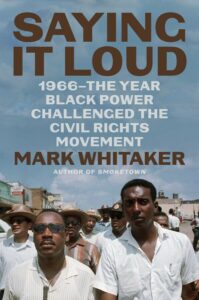 Saying It Loud: 1966–The Year Black Power Challenged the Civil Rights Movement. Mark Whitaker (Simon & Schuster) $29.99
Saying It Loud: 1966–The Year Black Power Challenged the Civil Rights Movement. Mark Whitaker (Simon & Schuster) $29.99 At Home on an Unruly Planet: Finding Refuge on a Changed Earth Madeline Ostrander (Holt) $28.99
At Home on an Unruly Planet: Finding Refuge on a Changed Earth Madeline Ostrander (Holt) $28.99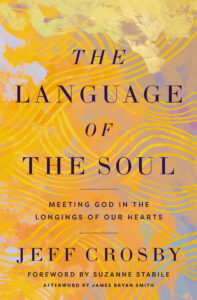 The Language of the Soul: Meeting God in the Longings of Our Hearts Jeff Crosby (Broadleaf Books) $26.99
The Language of the Soul: Meeting God in the Longings of Our Hearts Jeff Crosby (Broadleaf Books) $26.99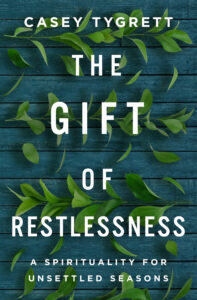 The Gift of Restlessness: A Spirituality for Unsettled Seasons Casey Tygrett (Broadleaf Books) $18.99
The Gift of Restlessness: A Spirituality for Unsettled Seasons Casey Tygrett (Broadleaf Books) $18.99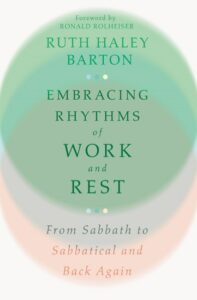 Embracing Rhythms of Work and Rest: From Sabbath to Sabbatical and Back Again Ruth Haley Barton (IVP) $25.00
Embracing Rhythms of Work and Rest: From Sabbath to Sabbatical and Back Again Ruth Haley Barton (IVP) $25.00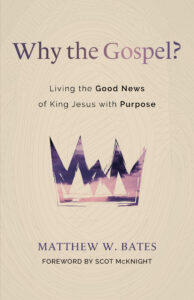 Why the Gospel? Living the Good News of King Jesus with Purpose
Why the Gospel? Living the Good News of King Jesus with Purpose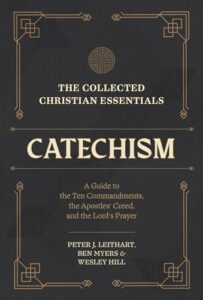 The Collected Christian Essentials: Catechism – A Guide to the Ten Commandments, the Apostles’ Creed, and the Lord’s Prayer Peter Leithart, Ben Myers, and Wesley Hill (general editor Todd R. Hains) (Lexham Press) $36.99
The Collected Christian Essentials: Catechism – A Guide to the Ten Commandments, the Apostles’ Creed, and the Lord’s Prayer Peter Leithart, Ben Myers, and Wesley Hill (general editor Todd R. Hains) (Lexham Press) $36.99 Beyond Homelessness: Christian Faith in a Culture of Displacement Stephen Bouma-Prediger & Brian J. Walsh (Eerdmans) $39.99
Beyond Homelessness: Christian Faith in a Culture of Displacement Stephen Bouma-Prediger & Brian J. Walsh (Eerdmans) $39.99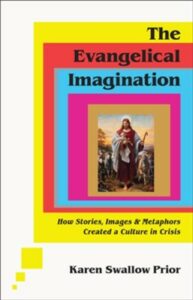 The Evangelical Imagination: How Stories, Images, and Metaphors Created a Culture in Crisis
The Evangelical Imagination: How Stories, Images, and Metaphors Created a Culture in Crisis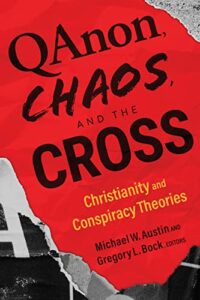 QAnon, Chaos and the Cross: Christianity and Conspiracy Theories edited by Michael Austin and Gregory Bock (Eerdmans) $24.99
QAnon, Chaos and the Cross: Christianity and Conspiracy Theories edited by Michael Austin and Gregory Bock (Eerdmans) $24.99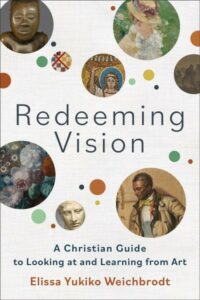 Redeeming Vision: A Christian Guide to Looking at and Learning from Art Elissa Yukiko Weichbrodt (Baker Academic) $29.99 OUR SALE PRICE = $23.99
Redeeming Vision: A Christian Guide to Looking at and Learning from Art Elissa Yukiko Weichbrodt (Baker Academic) $29.99 OUR SALE PRICE = $23.99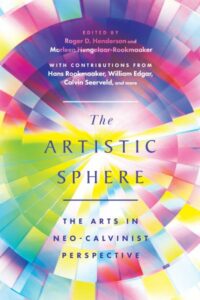 The Artistic Sphere: The Arts in Neo-Calvinist Perspective edited by Roger Henderson and Marleen Hengelaar-Rookmaaker (IVP Academic) $45.00 OUR SALE PRICE = $36.00
The Artistic Sphere: The Arts in Neo-Calvinist Perspective edited by Roger Henderson and Marleen Hengelaar-Rookmaaker (IVP Academic) $45.00 OUR SALE PRICE = $36.00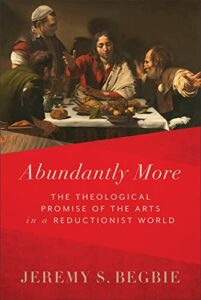 Abundantly More: The Theological Promise of the Arts in a Reductionist World Jeremy S. Begbie (Baker Academic) $39.99 OUR SALE PRICE = $31.99
Abundantly More: The Theological Promise of the Arts in a Reductionist World Jeremy S. Begbie (Baker Academic) $39.99 OUR SALE PRICE = $31.99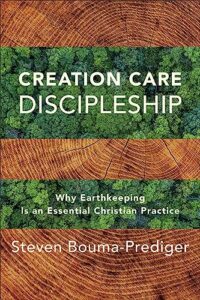 Creation Care Discipleship: Why Earthkeeping Is an Essential Christian Practice Steven Bouma-Prediger (Baker Academic) $25.99
Creation Care Discipleship: Why Earthkeeping Is an Essential Christian Practice Steven Bouma-Prediger (Baker Academic) $25.99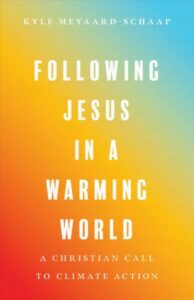 Following Jesus in a Warming World: A Christian Call to Climate Action Kyle Mayaard-Schaap (IVP) $18.00
Following Jesus in a Warming World: A Christian Call to Climate Action Kyle Mayaard-Schaap (IVP) $18.00 So We & Our Children May Live: Following Jesus in Confronting the Climate Crisis Sarah Augustine & Sheri Hostetler with a foreword by Patty Krawec (Herald Press) $18.99
So We & Our Children May Live: Following Jesus in Confronting the Climate Crisis Sarah Augustine & Sheri Hostetler with a foreword by Patty Krawec (Herald Press) $18.99 The Just Kitchen: Invitations to Sustainability, Cooking, Connection, and Celebration Derrick Weston & Anna Woofenden (Broadleaf Books) $29.99
The Just Kitchen: Invitations to Sustainability, Cooking, Connection, and Celebration Derrick Weston & Anna Woofenden (Broadleaf Books) $29.99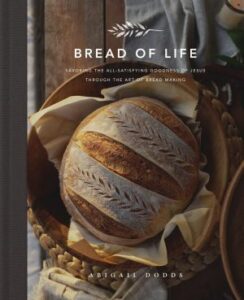 Bread of Life: Savoring the All Satisfying Goodness of Jesus Through the Art of Bread Making Abigail Dodds (Crossway) $29.99
Bread of Life: Savoring the All Satisfying Goodness of Jesus Through the Art of Bread Making Abigail Dodds (Crossway) $29.99 Soul Food Love: Healthy Recipes Inspired by One Hundred Years of Cooking in a Black Family Alice Randall & Caroline Randall Williams (Potter) $30.00
Soul Food Love: Healthy Recipes Inspired by One Hundred Years of Cooking in a Black Family Alice Randall & Caroline Randall Williams (Potter) $30.00 Company: The Radically Casual Art of Cooking for Others – Recipes, Menus, Advice
Company: The Radically Casual Art of Cooking for Others – Recipes, Menus, Advice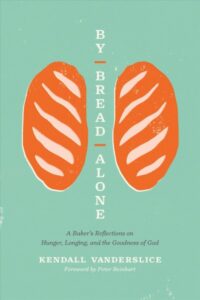 By Bread Alone: A Baker’s Reflections on Hunger, Longing, and the Goodness of God Kendall Vanderslice (Tyndale) $17.99
By Bread Alone: A Baker’s Reflections on Hunger, Longing, and the Goodness of God Kendall Vanderslice (Tyndale) $17.99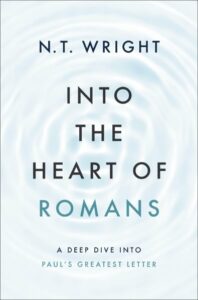 Into the Heart of Romans: A Deep Dive Into Paul’s Greatest Letter N.T. Wright (Zondervan Academic) $29.99 OUR SALE PRICE = $23.99
Into the Heart of Romans: A Deep Dive Into Paul’s Greatest Letter N.T. Wright (Zondervan Academic) $29.99 OUR SALE PRICE = $23.99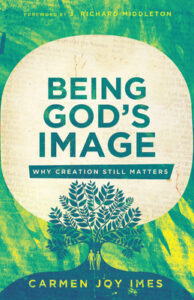 Being God’s Image: Why Creation Still Matters
Being God’s Image: Why Creation Still Matters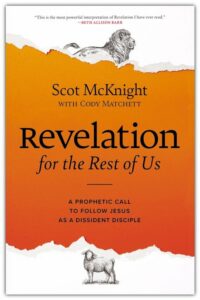 Revelation for the Rest of Us: A Prophetic Call to Follow Jesus as a Dissident Disciple Scot McKnight (Zondervan) $26.99
Revelation for the Rest of Us: A Prophetic Call to Follow Jesus as a Dissident Disciple Scot McKnight (Zondervan) $26.99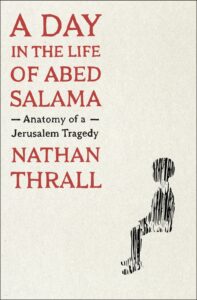 A Day in the Life of Abed Salama: Anatomy of a Jerusalem Tragedy Nathan Thrall (Metropolitan Books) $29.99 OUR SALE PRICE = $23.99
A Day in the Life of Abed Salama: Anatomy of a Jerusalem Tragedy Nathan Thrall (Metropolitan Books) $29.99 OUR SALE PRICE = $23.99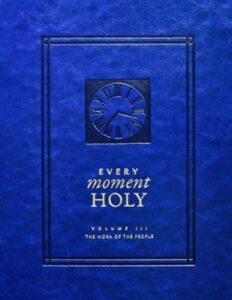 Every Moment Holy Volume III: The Work of the People edited and compiled by Douglas McKelvey (Rabbit Room Press) $35.00
Every Moment Holy Volume III: The Work of the People edited and compiled by Douglas McKelvey (Rabbit Room Press) $35.00 But they are also fun, down-to-Earth guys who quite literally have their feet on the ground; Steve teaches environmental studies as a theological ecologist (at Hope College in Holland, Michigan) and writes movingly about hiking and wilderness experiences and his love for the local watershed (where he bikes a lot, I’ve learned.) Brian is a former campus minister, and now a farmer, caring, with his wife and partner, author Sylvia Keesmaat, for The Russet House Farm in Ontario. They are Biblical people, full of Godly hope, and they enjoy life, good meals, (and have a mutual admiration for any number of folk and rock musicians, not least of which is
But they are also fun, down-to-Earth guys who quite literally have their feet on the ground; Steve teaches environmental studies as a theological ecologist (at Hope College in Holland, Michigan) and writes movingly about hiking and wilderness experiences and his love for the local watershed (where he bikes a lot, I’ve learned.) Brian is a former campus minister, and now a farmer, caring, with his wife and partner, author Sylvia Keesmaat, for The Russet House Farm in Ontario. They are Biblical people, full of Godly hope, and they enjoy life, good meals, (and have a mutual admiration for any number of folk and rock musicians, not least of which is  Bruce Cockburn, who Brian has a whole book about.) They are, truly, “kicking at the darkness until it bleeds daylight” and, it seems, having a blast doing it.
Bruce Cockburn, who Brian has a whole book about.) They are, truly, “kicking at the darkness until it bleeds daylight” and, it seems, having a blast doing it.

 serving the CRC as campus chaplain at the University of Toronto where he helped lead the Wine Before Breakfast community. A festschrift full of fascinating pieces and lovely stories to honor him, it was called A Sort of Homecoming: Essays Honoring the Academic and Community Work of Brian Walsh edited by Marcias Boniferro, Amanda Jagt, and Andrew Stephens-Rennie (Pickwick Publications) $34.00 – OUR SALE PRICE = $27.30. Four people I’ve mentioned above, Alan Graham, Richard Middleton, N.T. Wright, and Beyond Homelessness co-author Steve Bouma-Prediger, all have excellent pieces in this amazing collection. And there’s plenty more. One reviewer, an urban church planter, said it will “leave you with a case of holy homesickness.” And I said, “This book will open your ears to the hope and homecoming embedded in Scripture’s story.”
serving the CRC as campus chaplain at the University of Toronto where he helped lead the Wine Before Breakfast community. A festschrift full of fascinating pieces and lovely stories to honor him, it was called A Sort of Homecoming: Essays Honoring the Academic and Community Work of Brian Walsh edited by Marcias Boniferro, Amanda Jagt, and Andrew Stephens-Rennie (Pickwick Publications) $34.00 – OUR SALE PRICE = $27.30. Four people I’ve mentioned above, Alan Graham, Richard Middleton, N.T. Wright, and Beyond Homelessness co-author Steve Bouma-Prediger, all have excellent pieces in this amazing collection. And there’s plenty more. One reviewer, an urban church planter, said it will “leave you with a case of holy homesickness.” And I said, “This book will open your ears to the hope and homecoming embedded in Scripture’s story.” ORDER NOW AND WE WILL SEND A FREE BOOK BY CALVIN SEERVELD WITH EVERY PURCHASE.
ORDER NOW AND WE WILL SEND A FREE BOOK BY CALVIN SEERVELD WITH EVERY PURCHASE.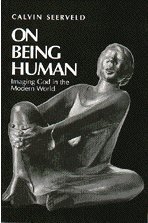 Yep, buy a daily devotional from this list (this week) and receive as our thank you gift a personal favorite which I have mentioned occasionally before — On Being Human: Imaging God in the Modern World which has Calvin Seerveld reflecting on art objects and Biblical texts to inspire us to see what it means to be human. There are seven detailed chapters, black and white art reproductions (and an Advent hymn, written by Seerveld.) This gift is made possible by a donation of books by Seerveld himself, given to support our work.
Yep, buy a daily devotional from this list (this week) and receive as our thank you gift a personal favorite which I have mentioned occasionally before — On Being Human: Imaging God in the Modern World which has Calvin Seerveld reflecting on art objects and Biblical texts to inspire us to see what it means to be human. There are seven detailed chapters, black and white art reproductions (and an Advent hymn, written by Seerveld.) This gift is made possible by a donation of books by Seerveld himself, given to support our work.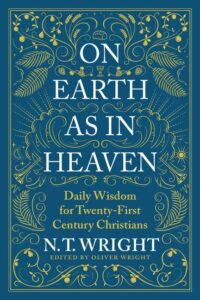 On Earth as in Heaven: Daily Wisdom for Twenty-First Century Christians N.T. Wright (HarperOne) $29.99 OUR SALE PRICE = $23.99
On Earth as in Heaven: Daily Wisdom for Twenty-First Century Christians N.T. Wright (HarperOne) $29.99 OUR SALE PRICE = $23.99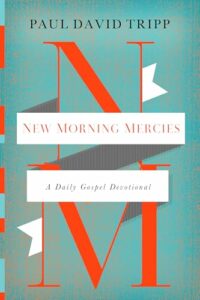 New Morning Mercies: A Daily Gospel Devotional Ted Tripp (Crossway) $24.99 OUR SALE PRICE = $19.99
New Morning Mercies: A Daily Gospel Devotional Ted Tripp (Crossway) $24.99 OUR SALE PRICE = $19.99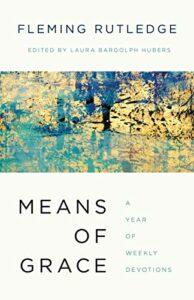 Means of Grace: A Year of Weekly Devotions Fleming Rutledge (Eerdmans) $24.99 OUR SALE PRICE = $19.99
Means of Grace: A Year of Weekly Devotions Fleming Rutledge (Eerdmans) $24.99 OUR SALE PRICE = $19.99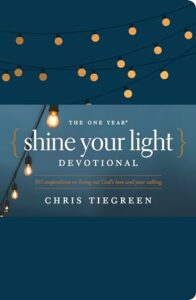 The One Year Shine Your Light Devotional: 365 Inspirations on Living Out God’s Love and Your Calling Chris Tiegreen (Tyndale) $24.99 OUR SALE PRICE = $19.99
The One Year Shine Your Light Devotional: 365 Inspirations on Living Out God’s Love and Your Calling Chris Tiegreen (Tyndale) $24.99 OUR SALE PRICE = $19.99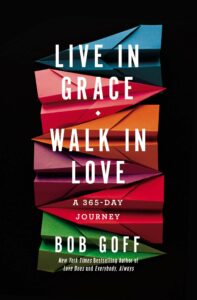 Live in Grace, Walk in Love: A 365-Day Journey Bob Goff (Thomas Nelson) $26.99 OUR SALE PRICE = $21.59
Live in Grace, Walk in Love: A 365-Day Journey Bob Goff (Thomas Nelson) $26.99 OUR SALE PRICE = $21.59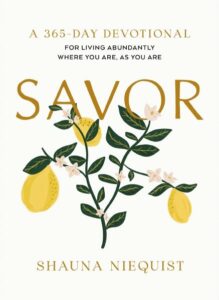 Savor: A 365-Day Devotional for Living Abundantly Where You Are, As You Are Shauna Niequist (Zondervan) $22.99 OUR SALE PRICE = $18.39
Savor: A 365-Day Devotional for Living Abundantly Where You Are, As You Are Shauna Niequist (Zondervan) $22.99 OUR SALE PRICE = $18.39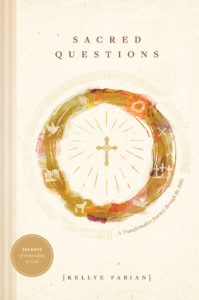 Sacred Questions: A Transformative Journey Through the Bible — 365 Days of Responding to God Kellye Fabian (NavPress) $22.99 OUR SALE PRICE = $18.39
Sacred Questions: A Transformative Journey Through the Bible — 365 Days of Responding to God Kellye Fabian (NavPress) $22.99 OUR SALE PRICE = $18.39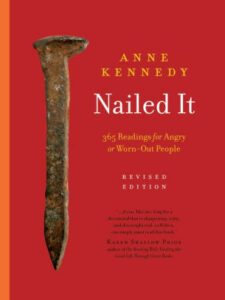 Nailed It: 365 Readings for Angry or Worn Out People Anne Kennedy (Square Halo Books) $27.99 OUR SALE PRICE = $22.39
Nailed It: 365 Readings for Angry or Worn Out People Anne Kennedy (Square Halo Books) $27.99 OUR SALE PRICE = $22.39 Heaven and Nature Sing: 365 Daily Devotionals for Outdoor and Nature Lovers edited by Sharon Brodin (Brodin Press) $16.00 OUR SALE PRICE = $12.80
Heaven and Nature Sing: 365 Daily Devotionals for Outdoor and Nature Lovers edited by Sharon Brodin (Brodin Press) $16.00 OUR SALE PRICE = $12.80 Let Creation Speak! 100 Invitations to Wonder Michael Guillen (Tyndale) $19.99 OUR SALE PIRCE = $15.99
Let Creation Speak! 100 Invitations to Wonder Michael Guillen (Tyndale) $19.99 OUR SALE PIRCE = $15.99 Upon Waking: A Sixty-Day Devotional Jackie Hill Perry (B+H) $22.99 OUR SALE PIRCE = $18.39
Upon Waking: A Sixty-Day Devotional Jackie Hill Perry (B+H) $22.99 OUR SALE PIRCE = $18.39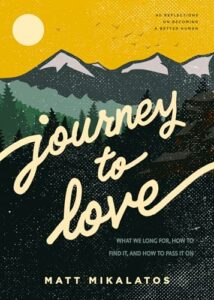 Journey to Love: What We Long For, How to Find It, and How to Pass It On: 40 Reflections on Become a Better Human Matt Mikalatos (NavPress) $7.99 OUR SALE PRICE = $6.39
Journey to Love: What We Long For, How to Find It, and How to Pass It On: 40 Reflections on Become a Better Human Matt Mikalatos (NavPress) $7.99 OUR SALE PRICE = $6.39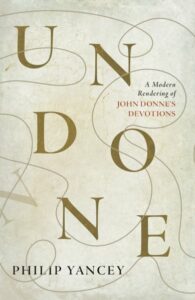 Undone: A Modern Rendering of John Donne’s Devotions Philip Yancey (Rabbit Room) $18.00 OUR SALE PIRCE = $14.40
Undone: A Modern Rendering of John Donne’s Devotions Philip Yancey (Rabbit Room) $18.00 OUR SALE PIRCE = $14.40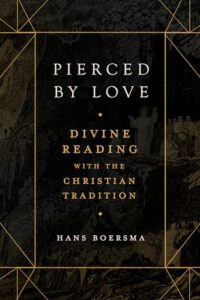 Pierced By Love: Divine Reading with the Christian Tradition Hans Boersma (Lexham Press) $22.99 OUR SALE PIRCE = $18.39
Pierced By Love: Divine Reading with the Christian Tradition Hans Boersma (Lexham Press) $22.99 OUR SALE PIRCE = $18.39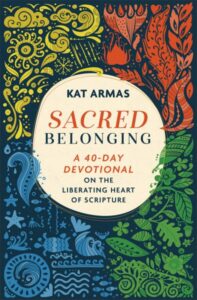 Sacred Belonging: A 40-Day Devotional on the Liberating Heart of Scripture Kat Armas (Brazos Press) $18.99 OUR SALE PRICE = $15.19
Sacred Belonging: A 40-Day Devotional on the Liberating Heart of Scripture Kat Armas (Brazos Press) $18.99 OUR SALE PRICE = $15.19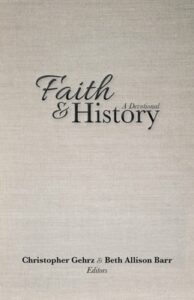 Faith & History: A Devotional edited by Christopher Gehrz & Beth Allison Barr (1845 Books / Baylor University Press) $14.95 OUR SALE PRICE = $11.96
Faith & History: A Devotional edited by Christopher Gehrz & Beth Allison Barr (1845 Books / Baylor University Press) $14.95 OUR SALE PRICE = $11.96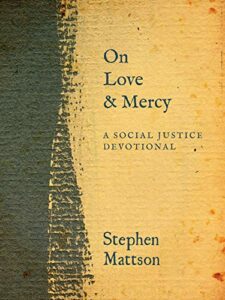 On Love & Mercy: A Social Justice Devotional Stephen Mattson (Herald Press) $21.99 OUR SALE PRICE = $17.59
On Love & Mercy: A Social Justice Devotional Stephen Mattson (Herald Press) $21.99 OUR SALE PRICE = $17.59 The Practice of the Presence of Jesus: Daily Meditations on the Nearness of Our Savior Joni Eareckson Tada with John Sloan (Multnomah) $20.00 OUR SALE PRICE = $16.00
The Practice of the Presence of Jesus: Daily Meditations on the Nearness of Our Savior Joni Eareckson Tada with John Sloan (Multnomah) $20.00 OUR SALE PRICE = $16.00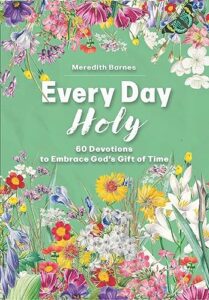 Every Day Holy: 60 Devotions to Embrace God’s Gift of Time Meredith Barnes (Paraclete Press) $17.99 OUR SALE PRICE = $14.39
Every Day Holy: 60 Devotions to Embrace God’s Gift of Time Meredith Barnes (Paraclete Press) $17.99 OUR SALE PRICE = $14.39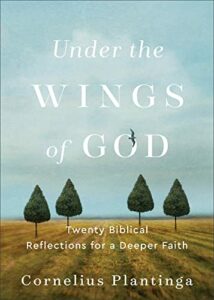 Under the Wings of God: Twenty Biblical Reflections for a Deeper Faith Cornelius Plantinga (Brazos Press) $18.99 OUR SALE PRICE = $15.19
Under the Wings of God: Twenty Biblical Reflections for a Deeper Faith Cornelius Plantinga (Brazos Press) $18.99 OUR SALE PRICE = $15.19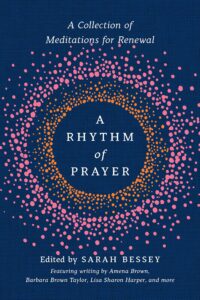 A Rhythm of Prayer: A Collection of Meditations for Renewal edited and compiled by Sarah Bessey (Convergent) $21.00 OUR SALE PRICE = $16.80
A Rhythm of Prayer: A Collection of Meditations for Renewal edited and compiled by Sarah Bessey (Convergent) $21.00 OUR SALE PRICE = $16.80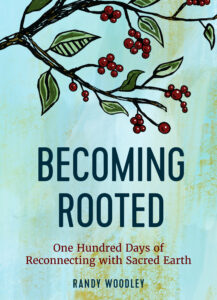 Becoming Rooted: One Hundred Days of Reconnecting with Sacred Earth Randy Woodley (Broadleaf Books) $19.99 OUR SALE PRICE = $15.99
Becoming Rooted: One Hundred Days of Reconnecting with Sacred Earth Randy Woodley (Broadleaf Books) $19.99 OUR SALE PRICE = $15.99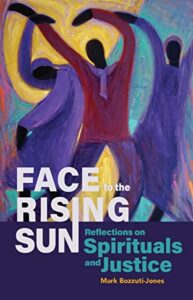 Face to the Rising Sun: Reflections on Spirituals and Justice Mark Bozzuti-Jones (Forward Movement) $18.00 OUR SALE PRICE = $14.40
Face to the Rising Sun: Reflections on Spirituals and Justice Mark Bozzuti-Jones (Forward Movement) $18.00 OUR SALE PRICE = $14.40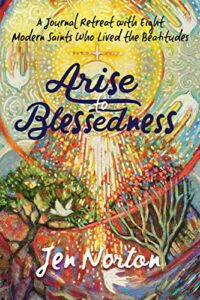 Ar
Ar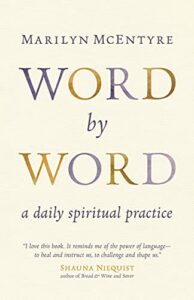 Word by Word: A Daily Spiritual Practice
Word by Word: A Daily Spiritual Practice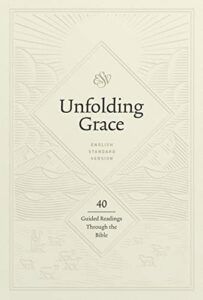 Unfolding Grace: 40 Guided Readings Through the Bible ESV (Crossway) $19.99 OUR SALE PRICE = $15.99
Unfolding Grace: 40 Guided Readings Through the Bible ESV (Crossway) $19.99 OUR SALE PRICE = $15.99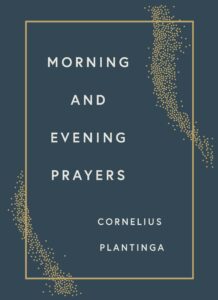 Morning and Evening Prayers Cornelius Plantinga (Eerdmans) $19.99 OUR SALE PRICE = $15.99
Morning and Evening Prayers Cornelius Plantinga (Eerdmans) $19.99 OUR SALE PRICE = $15.99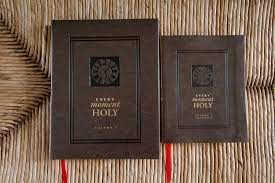 Every Moment Holy volume I – leather-bound hardback
Every Moment Holy volume I – leather-bound hardback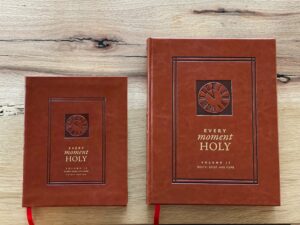 Every Moment Holy volume II: Death, Grief, and Hope –
Every Moment Holy volume II: Death, Grief, and Hope –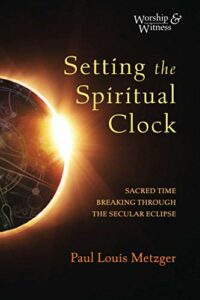 This was, in fact, why we hosted a webinar a month ago with my friend, the theological rock star, Paul Louis Metzger. We chatted for more than an hour about a book released not long ago done in association with the Calvin Institute of Christian Worship, a lovely study called Setting the Spiritual Clock: Sacred Time Breaking Through the Secular Eclipse (Cascade; $34.00; OUR SALE PRICE = $27.20.)
This was, in fact, why we hosted a webinar a month ago with my friend, the theological rock star, Paul Louis Metzger. We chatted for more than an hour about a book released not long ago done in association with the Calvin Institute of Christian Worship, a lovely study called Setting the Spiritual Clock: Sacred Time Breaking Through the Secular Eclipse (Cascade; $34.00; OUR SALE PRICE = $27.20.)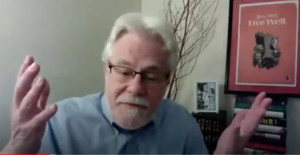 Spiritual Clock. It is about a book we truly value by an author whose friendship means much. It was a discussion about a book that we were honored to help promote and I wanted to suggest it even now as we are soon to turn our calendars ahead to a new year. We hope you enjoy the recording of the webinar. Part way through you’ll discover that there were provocative questions offered by online participants and we jive around all over, with Paul masterfully responding to all sorts of questions and comments. One or two
Spiritual Clock. It is about a book we truly value by an author whose friendship means much. It was a discussion about a book that we were honored to help promote and I wanted to suggest it even now as we are soon to turn our calendars ahead to a new year. We hope you enjoy the recording of the webinar. Part way through you’ll discover that there were provocative questions offered by online participants and we jive around all over, with Paul masterfully responding to all sorts of questions and comments. One or two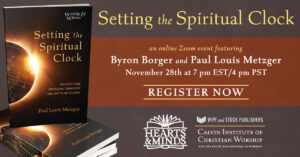 were a bit skeptical, one or two wondered how he might expand his insights about the rhythms and seasons built into the creation, and others wanted some practical help about how to get one’s spiritual formation practice more attuned to the liturgical seasons. Can this really help
were a bit skeptical, one or two wondered how he might expand his insights about the rhythms and seasons built into the creation, and others wanted some practical help about how to get one’s spiritual formation practice more attuned to the liturgical seasons. Can this really help  us as people? And what about church — what about worship styles and practices? As always, Paul invites us to read more and think together, to pray and seek God, to trust the Spirit. I think you’ll enjoy the chit chat and appreciate his warm and wise insight.
us as people? And what about church — what about worship styles and practices? As always, Paul invites us to read more and think together, to pray and seek God, to trust the Spirit. I think you’ll enjoy the chit chat and appreciate his warm and wise insight.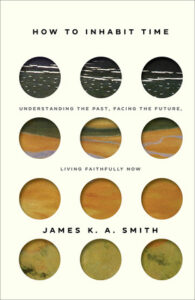 How to Inhabit Time: Understanding the Past, Facing the Future, Living Faithfully Now James K.A. Smith (Brazos Press) $24.99 OUR SALE PRICE = $19.99
How to Inhabit Time: Understanding the Past, Facing the Future, Living Faithfully Now James K.A. Smith (Brazos Press) $24.99 OUR SALE PRICE = $19.99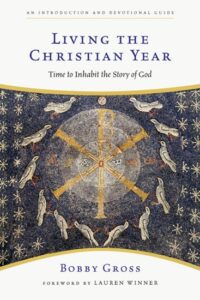 Living the Christian Year: Time to Inhabit the Story of God. Bobby Gross (IVP Formatio) $25.00 OUR SALE PRICE = $20.00
Living the Christian Year: Time to Inhabit the Story of God. Bobby Gross (IVP Formatio) $25.00 OUR SALE PRICE = $20.00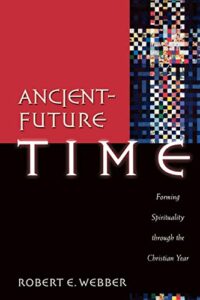 Ancient-Future Time: Forming Spirituality Through the Christian Year Robert Webber (Baker) $20.00 OUR SALE PRICE = $16.00
Ancient-Future Time: Forming Spirituality Through the Christian Year Robert Webber (Baker) $20.00 OUR SALE PRICE = $16.00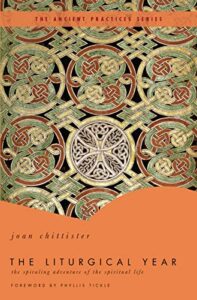 The Liturgical Year: The Spiraling Adventure of the Spiritual Life Joan Chittister (Thomas Nelson) $18.99 OUR SALE PRICE = $15.19
The Liturgical Year: The Spiraling Adventure of the Spiritual Life Joan Chittister (Thomas Nelson) $18.99 OUR SALE PRICE = $15.19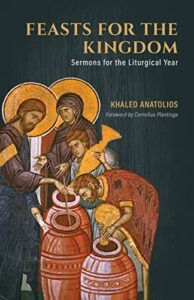 Feasts for the Kingdom: Sermons for the Liturgical Year Khaled Anatolios (Eerdmans) $19.99 OUR SALE PRICE = $15.99
Feasts for the Kingdom: Sermons for the Liturgical Year Khaled Anatolios (Eerdmans) $19.99 OUR SALE PRICE = $15.99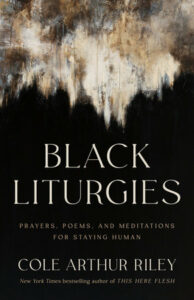 Black Liturgies: Prayers, Poems and Meditations for Staying Human Cole Arthur Riley (Convergent Books) $22.00 OUR SALE PRICE = $17.60 // ON SALE January 16, 2024
Black Liturgies: Prayers, Poems and Meditations for Staying Human Cole Arthur Riley (Convergent Books) $22.00 OUR SALE PRICE = $17.60 // ON SALE January 16, 2024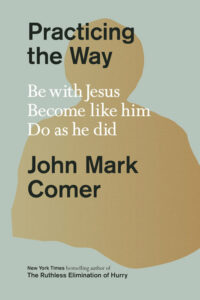 Practicing the Way: Be With Jesus, Become Like Him, Do as He Did John Mark Comer (Waterbrook) $26.00
Practicing the Way: Be With Jesus, Become Like Him, Do as He Did John Mark Comer (Waterbrook) $26.00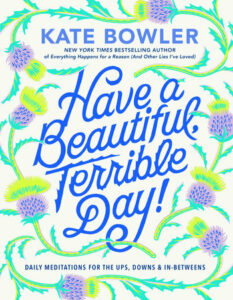 Have a Beautiful Terrible Day! Daily Meditations for the Ups, Downs & In-Betweens Kate Bowler (Convergent Books) $26.00
Have a Beautiful Terrible Day! Daily Meditations for the Ups, Downs & In-Betweens Kate Bowler (Convergent Books) $26.00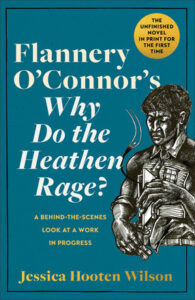 Flannery O’Connor’s Why Do the Heathen Rage? A Behind-The-Scenes Look at a Work in Progress Jessica Hooten Wilson; with illustrations by Steve Prince (Brazos Press) $24.99
Flannery O’Connor’s Why Do the Heathen Rage? A Behind-The-Scenes Look at a Work in Progress Jessica Hooten Wilson; with illustrations by Steve Prince (Brazos Press) $24.99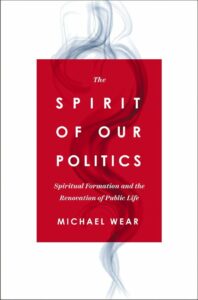 The Spirit of Our Politics: Spiritual Formation and the Renovation of Public Life Michael Wear (Zondervan) $18.99
The Spirit of Our Politics: Spiritual Formation and the Renovation of Public Life Michael Wear (Zondervan) $18.99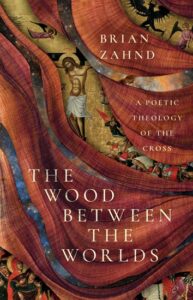 The Wood Between the Worlds: A Poetic Theology of the Cross Brian Zahnd (IVP) $24.00
The Wood Between the Worlds: A Poetic Theology of the Cross Brian Zahnd (IVP) $24.00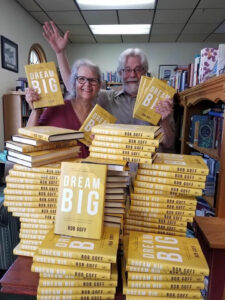 Which is why some days I’m struck with a profound realization of how lucky we are to be around book people, church folks, seekers and readers. And for good books that keep appearing and take our breaths away even in this busy time of year.
Which is why some days I’m struck with a profound realization of how lucky we are to be around book people, church folks, seekers and readers. And for good books that keep appearing and take our breaths away even in this busy time of year.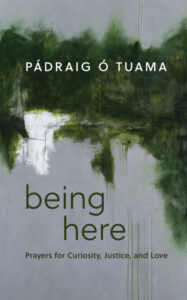 Being Here: Prayers for Curiosity, Justice, and Love Padraig O Tauma (Eerdmans) $22.99
Being Here: Prayers for Curiosity, Justice, and Love Padraig O Tauma (Eerdmans) $22.99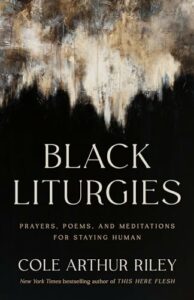 Being Here: Prayers for Curiosity… is a great new book and I’m rightfully enthused but you want to know something that really makes me smile. The very artful cover on it is a painting by Lanecia Rouse Tinsley of Houston and — get this — she also created an original painting for the forthcoming cover of a long-awaited book coming out next month by our friend Cole Arthur Riley, Black Liturgies. That little connection makes me grin. We’ve been taking pre-orders for Cole book, of course (at 20% off) and I’ll write about it soon. Be very glad.
Being Here: Prayers for Curiosity… is a great new book and I’m rightfully enthused but you want to know something that really makes me smile. The very artful cover on it is a painting by Lanecia Rouse Tinsley of Houston and — get this — she also created an original painting for the forthcoming cover of a long-awaited book coming out next month by our friend Cole Arthur Riley, Black Liturgies. That little connection makes me grin. We’ve been taking pre-orders for Cole book, of course (at 20% off) and I’ll write about it soon. Be very glad.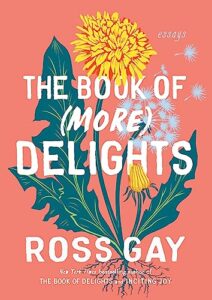 The Book of (More) Delights Ross Gay (Algonquin Books) $28.00
The Book of (More) Delights Ross Gay (Algonquin Books) $28.00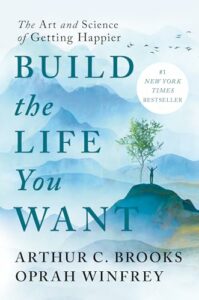 Build the Life You Want: The Art and Science of Getting Happier Arthur C. Brooks, with Oprah Winfrey (Portfolio) $30.00
Build the Life You Want: The Art and Science of Getting Happier Arthur C. Brooks, with Oprah Winfrey (Portfolio) $30.00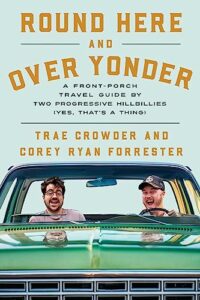 Round Here and Over Yonder: A Front-Porch Travel Guide by Two Progressive Hillbillies (Yes, That’s a Thing) Trae Crowder and Corey Ryan Forrester (Harper Horizon) $29.99
Round Here and Over Yonder: A Front-Porch Travel Guide by Two Progressive Hillbillies (Yes, That’s a Thing) Trae Crowder and Corey Ryan Forrester (Harper Horizon) $29.99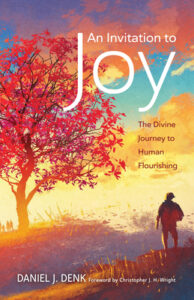 An Invitation to Joy: The Divine Journey to Human Flourishing Daniel Denk (Eerdmans) $24.99
An Invitation to Joy: The Divine Journey to Human Flourishing Daniel Denk (Eerdmans) $24.99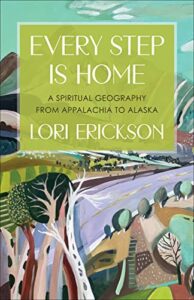 Every Step Is Home: A Spiritual Geography from Appalachia to Alaska Lori Erickson (WJK) $20.00
Every Step Is Home: A Spiritual Geography from Appalachia to Alaska Lori Erickson (WJK) $20.00 Sacred Strides: The Journey to Belovedness in Work and Rest Justin McRoberts (Thomas Nelson) $18.99 OUR SALE PRICE = $15.19
Sacred Strides: The Journey to Belovedness in Work and Rest Justin McRoberts (Thomas Nelson) $18.99 OUR SALE PRICE = $15.19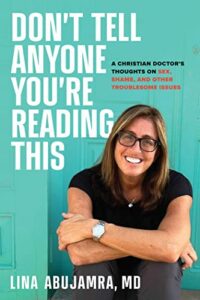 Don’t Tell Anyone You’re Reading This: A Christian Doctor’s Thoughts on Sex, Shame, and Other Troublesome Issues Lina Abujamra, MD (Forefront Books) $26.00
Don’t Tell Anyone You’re Reading This: A Christian Doctor’s Thoughts on Sex, Shame, and Other Troublesome Issues Lina Abujamra, MD (Forefront Books) $26.00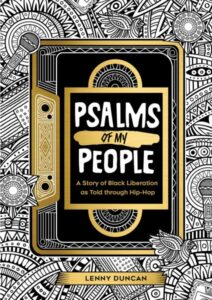 Psalms of My People: A Story of Black Liberation as Told Through Hip-Hop Lenny Duncan (Broadleaf Books) $27.99
Psalms of My People: A Story of Black Liberation as Told Through Hip-Hop Lenny Duncan (Broadleaf Books) $27.99